#and the clear french influence
Text
An illegal toxic dump site in Croatia, the theft of water from a major aquifer in southern Spain, illegal trading of ozone-depleting refrigerants in France: This is just a sampling of the environmental crimes that European countries are struggling to stop. The lack of accountability for these acts stems in part from the European Union’s legal code, which experts say is riddled with vague definitions and gaps in enforcement. That’s about to change.
Last week, EU lawmakers voted in a new directive that criminalizes cases of environmental damage “comparable to ecocide,” a term broadly defined as the severe, widespread, and long-term destruction of the natural world. Advocates called the move “revolutionary,” both because it sets strict penalties for violators, including up to a decade in jail, and because it marks the first time that an international body has created a legal pathway for the prosecution of ecocide.
“This decision marks the end of impunity for environmental criminals and could usher in a new age of environmental litigation in Europe,” wrote Marie Toussaint, a French lawyer and EU parliamentarian for the Greens/European Free Alliance group, on X...
The new directive uses the term “ecocide” in its preamble, but does not criminalize the act by laying out a legal definition (the most widely accepted definition of ecocide was developed by an international panel of experts in 2021). Instead, it works by providing a list of “qualified offenses,” or crimes that fall within its purview. These include pollution from ships, the introduction of invasive species, and ozone depletion...
The new law holds people liable for environmental destruction if they acted with knowledge of the damage their actions would cause. This aspect of the law is important, experts said, because it means that a permit is no longer enough for a company to avoid culpability.
“If new information shows that behavior is causing irreversible damage to health and nature – you will have to stop,” a member of the European Parliament from the Netherlands, Antonius Manders, told Euronews.
Advocates like Mehta hope that the EU’s move will have influence beyond Europe’s borders. The principal goal of the Stop Ecocide campaign is for the International Criminal Court to designate ecocide as the fifth international crime that it prosecutes, after crimes against humanity, war crimes, crimes of aggression, and genocide. At the moment, environmental destruction can only be prosecuted as a war crime at the ICC, and limitations in the law make this extremely difficult to do...
Kate Mackintosh, the executive director of the Netherlands-based UCLA Law Promise Institute Europe, told Grist that the ICC is unlikely to adopt an ecocide law if other countries do not do so first.
“It’s not something you can just pull out of thin air,” she said, adding that any international legal doctrine has to have a precedent on the national level. “That’s the way states are going to accept it.”
The EU’s 27 member states will have two years to adapt the new legislation into their penal codes. Afterwards, their implementation must be reviewed and updated at least once every five years using a “risk-analysis based approach,” to account for advancements in experts’ understanding of what might constitute an environmental crime. Mehta said that despite its omission of some important offenses, the law sets an important example for other countries. Several days before the EU vote, Belgium adapted its criminal code to include the directive, making it the first country in Europe to recognize ecocide as a crime.
The ruling “shows leadership and compassion,” Mehta said. “It will establish a clear moral as well as legal ‘red line’, creating an essential steer for European industry leaders and policy-makers going forward.”
-via Grist, March 6, 2024
#climate change#climate crisis#climate catastrophe#climate action#eu#european union#icc#international criminal court#belgium#europe#environment#environmental law#environmental news#ecocide#good news#hope#hope posting
723 notes
·
View notes
Note
so i was reading wolf king and you mention jason having a jersey accent and i wanted to ask.......what accent does dick have? he's french and was raised travelling around europe (thank u for french dick btw i'm obsessed), and then was raised by bruce and alfred, and then lived with the titans a lot as a teenager (some of whom i guess sound american and some of whom don't). where does this leave his accent. i deeply need to hear your opinion about this
this is such a great q so im gonna hijack it a lil and talk about how the bats hide their identities in different ways — like with the voice modulators, i don’t believe they’d be walking around with their real voices fighting crime
so kevin conroy kickstarted the trend of bruce having a voice and then batman having a voice. which is a good cinematic take, tbc, but i think he had it backwards. bruce as batman has a naturally deep, rumbling timbre, and bruce as socialite brucie wayne is higher pitched and more energetic — think a cross between pauly d and zach braff. bruce normally talks with distinct british influences. super clear vowel pronunciation.
by that same token, i think dick deffo still has an accent, but obviously puts on a generic “american” accent while in costume. his normal cadence would be an interesting combination of stuff. like u mentioned, he spent a lot of time around alfred and donna and kory so that definitely affected the way that he speaks. i think baseline…. he sounds a bit like marion cotillard? very subtle inflection, with some british intonation mixed in. kind of indistinct, like you’d clock him as vaguely european. he might make it more pronounced to distinguish himself from nightwing.
jason, tim, steph, and duke would all have distinct gotham accents, but deciding whether u want them to sound more philly or more ny is kinda up to interpretation ig. im not an expert. jason’s accent has probably changed over time — profound brain damage and extended period abroad will do that, but i imagine he leans into it heavily around his allies to emphasise his identity as a gothamite. depending on canon, babs would have an ohio accent and because she was a very influential figure to cass, cass would probably have that same weird collection of intonations — british, variations of east coast, etc.
if we’re going off on-screen depictions of the al-ghuls, damian would have an rp accent that would probably soften a little after his time in gotham. tim and duke probably sound similar, and steph might fall between them and jason. in my heart, the joker sounds like snooki.
#let brucie sound like an influencer aaaand post#dick grayson#bruce Wayne#batman#nightwing#batfam#Jason todd#tim Drake#cassandra cain#red hood#robin#dc comics#the ask and the answer#persephone tag
191 notes
·
View notes
Text
How the Nazis destroyed the queer and trans culture of Berlin

Given the current anti-trans hysteria found among TERFs and the far right, it is important to remember the history of the LGBTQ community. Berlin had once a thriving queer culture, with a research institute that studied and helped queer and transgender people.
Michael Lombardi-Nash has taken the time to translate all the central works of the German LGBTQ movement before the Nazi takeover, including the researcher and activis Magnus Hirschfeld's research on gay and trans people.
Why is this important? Because that anti-trans movement is trying to get people to believe that being transgender is a new thing. It is not, and the texts and stories from Germany in the early 20th century prove it.
Magnus Hirschfeld was a gay activist, feminist, scientist and founder of the Institute for Sexual Research in Berlin (1919-1933). His support for both gay and trans people was radical and innovative.
The institute was essential in the LGBTQ struggle of the time, and his thinking continue to influence our understanding of queer and trans lives.
Magnus is the one with the glasses in the photo above.
In 1933 the Nazis took over Germany, and they started attacking the LGBTQ community straight away. They sacked Hirschfeld's institute, arguing that being gay or trans was against Germanic ideals. They burned most of the institute's book collection.
As you can see from the photo below, some of the posters they destroyed are of Lili Elbe, a Danish painter and trans woman who got gender-affirming surgery in Berlin.

“Far be it from me to want to turn to fascism,” a French councilor said before the war, “but...we have to agree that in some things those regimes have sometimes done good…"
He continued: "One day Hitler and Mussolini woke up and said, ‘Honestly, the scandal has gone on long enough’ … And … the inverts … were chased out of Germany and Italy the very next day.”" "Invert" refers to both gay and trans people.
Now Putin, the American far right and the TERFs want to “eradicate transgenderism”. “Those who cannot remember the past are condemned to repeat it.”
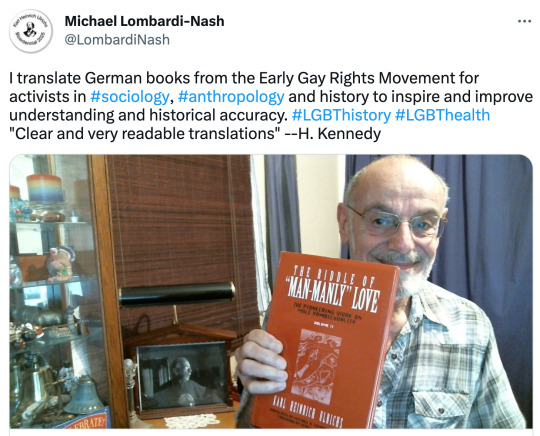
Tweet from Lombardi-Nash:
“I translate German books from the Early Gay Rights Movement for activists in #sociology, #anthropology and history to inspire and improve understanding and historical accuracy. #LGBThistory #LGBThealth
"Clear and very readable translations" --H. Kennedy”
See also: Magnus Hirschfeld's Understanding of Transgender People
#transgender#trans#queer#gay#lesbian#lgbt#lgbtqa#transphobia#history#anthropology#sociaology#lgbthistory#lgbthealth#politics
848 notes
·
View notes
Text
The Black family as representatives of ancient "Anglo-Saxon elite"
To me Blacks were never partially French. I'm not saying the headcanon "Blacks are partially French" isn't valid, it's just not as interesting to me and it strips away nuances from their history. Here's why.
(It’s just my fantasies mixed with historical facts! Don’t take it too seriously)
Firstly, their choice of surname.
I've noticed that two main Death Eater families bear surnames of French and Norman origin. Lestrange and Malfoy (fictional, but the "origin" is clear). And then there's Rosier and Avery. Rosier – definitely French, and Avery – from the Middle English and Anglo-Norman French personal name Aevery, a Norman form of Alfred. There are no other surnames like this in Harry Potter, except for Peverell (correct me if I'm wrong).
Clearly, this is a reference to the Norman Conquest of 1066. These Death Eaters could be associated with aristocratic and influential families who came to England after the Norman Conquest. This is a nod to the historical division in English society between Normans and Anglo-Saxons, where Normans represented the upper echelon of society, while Anglo-Saxons were less privileged.
Yes, I'm Captain Obvious here. So let's move on to the Blacks.
The surname Black is typically Anglo-Saxon. It could have derived from the Old English word 'blæc,' meaning 'black' or 'dark,' and may have been used to describe someone who wore black clothing or had dark hair.
(Old English emerged around the 5th-6th centuries and was used in England for about 600 years, until the 11th century. This period ended after the Norman Conquest in 1066).
Hogwarts, canonically, appeared over 1000 years ago. That is, before the Norman Conquest. (But Hogwarts Castle couldn't exist yet, because castle technology was brought by the Normans). The Blacks call themselves "the noble and most ancient house of Black." That is, the oldest family, and also the noblest. Maybe they were "noble" in the sense that they belonged to the elite of Anglo-Saxon society (which was fragmented into small kingdoms). But they consider themselves the oldest family among those who trace their lineage and uphold the nobility (purity) of their blood. Considering that "Hogwarts" appeared before the Norman Conquest, I fantasize that such families already existed back then. A lot of families are extinct. Except the Blacks.
So the Blacks are a reflection of "Anglo-Saxon aristocracy." And here I headcanon that the Blacks still considered themselves more entitled than everyone else, mocked the Malfoys and Rosiers, and generally looked down on anything French. Fanatics to the bone and lovers of elevating themselves above all.
Why the motto in French – in the Middle Ages, the use of Latin and French languages was common among European aristocracy (despite the fact that there is NO aristocracy among wizards, but they could have been part of the aristocracy before the introduction of the Statute of Secrecy). The French language was often considered the language of diplomacy and culture, and its use in mottos and coats of arms was a common phenomenon. Here I just headcanon that one of the Blacks either had a strange sense of humour, or wanted to put an end to the ancient feud of the Blacks with all things French and start the family on some new beginnings. Maybe they married someone with French roots to expand their influence.
Of course, all this can be explained differently. The headcanon that the Blacks have some French part also makes sense. But for me personally, that's not so interesting, considering the obvious connections of the Lestranges and Rosiers with France (Vinda Rosier, Lestrange family Mausoleum in Paris). I prefer the Blacks who are so arrogant that they even consider themselves "true English wizards," not "like those Malfoys." And I headcanon that this was not a real confrontation, but rather a pretext for jokes and fuel for greater kindling of their vanity.
117 notes
·
View notes
Text
lmao k we’re gonna talk abt ashkenormativity and the weird hostility some of y’all have toward non ashki jews.
so yesterday i was trying to have a discussion on this post, and the person responded with this:

and then promptly blocked me.
after which they posted a bunch of bullshit that i am now going to tear to shreds.
regarding the above screenshot:
- if you’re defining yiddish culture as “ashkenazi jews who speak yiddish” you are still erasing multiple communities of ashkenazi jews. italian ashkenazi jews migrated or fled to northern italy during the middle ages, long before the establishment of the pale of settlement, and have a culture that is distinctly influenced by italian culture, not eastern european culture.
- sounds like you’re outright excluding any group of ashkenazi jews who don’t speak yiddish or live in central or eastern europe. which is literally the reason i started the dialogue in the first place.

- talking down to me as if i don’t know what the difference between ashkenazi and sephardi is.
- immediately followed by incorrectly defining ashkenazi. ashkenazim are a group of diaspora jews who originally settled in the ashkenaz. there are many different diaspora languages that ashkenazi jews spoke, including judeo-french, judeo-provençal, judeo-czech, and different dialects of judeo-italian.
- kinda sounds like ur saying eastern european jews who speak yiddish are the only “true” ashkenazi jews????????
- yeah there’s lots of issues surrounding the way eastern european jews were viewed, but that’s not what the conversation was about?????
- it’s not really up to you to have or not have an issue with who identifies as ashkenazi.
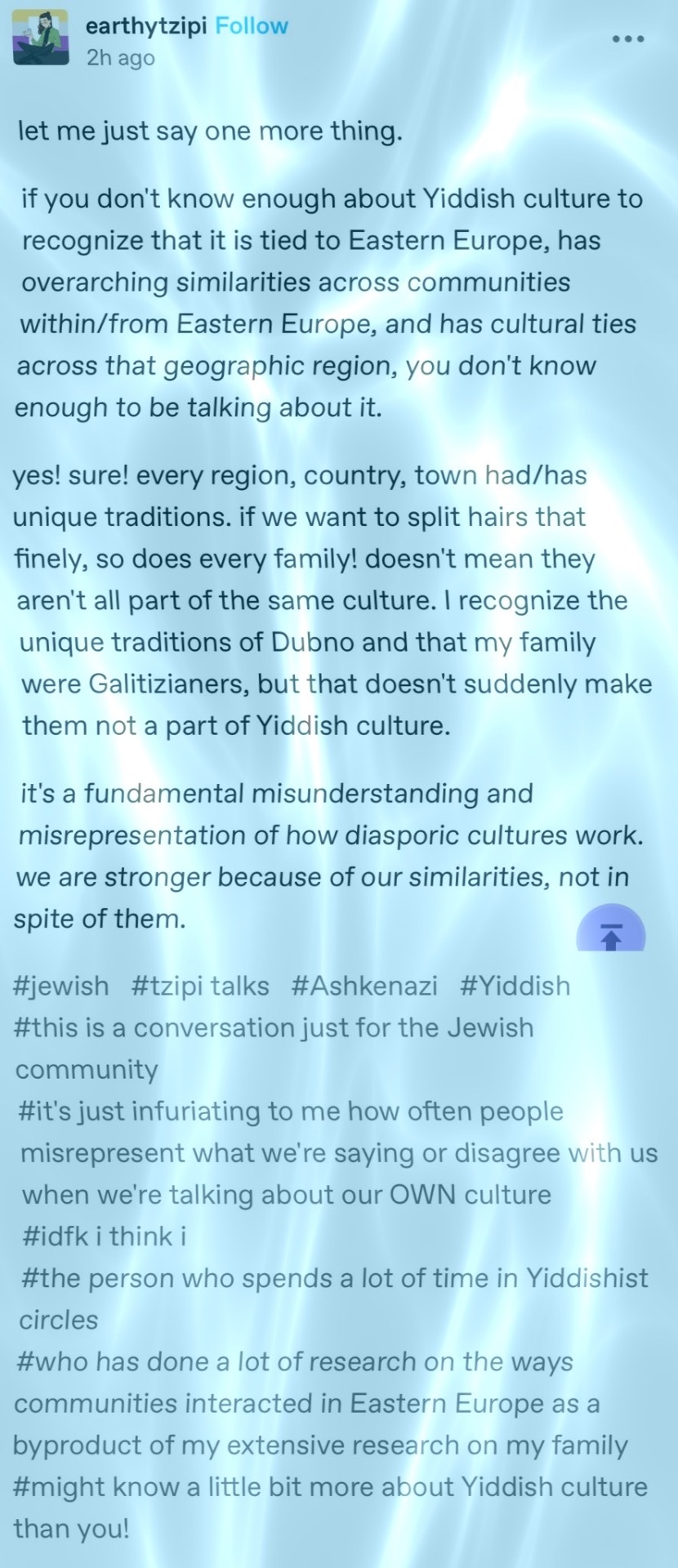
- there are many ashkenazi groups that have ties in eastern europe. there are also plenty who don’t. there’s overarching similarities between a lot of different diaspora groups, but that doesn’t make them the same. and that’s ok.
- kinda weird how you say “this is a conversation for the jewish community, infuriating how people disagree with us about our own culture” as if i’m not also jewish?? do you not consider me jewish enough to talk about jewish culture or history?
- it’s clear you’ve researched a lot about eastern european jews. it’s also clear that’s the only group you know anything about.

- this conversation had nothing to do with zionism?????? very fucking weird for u to say this??????? especially when i was literally trying to express that ashkenazi jews are incredibly diverse and can’t just be boiled down to “basically eastern european”??????????
- also again homogenizing all ashkenazi jews under “yiddish culture” when you’ve defined yiddish culture as being distinctly eastern european. which. again. not all ashkenazi jews are.
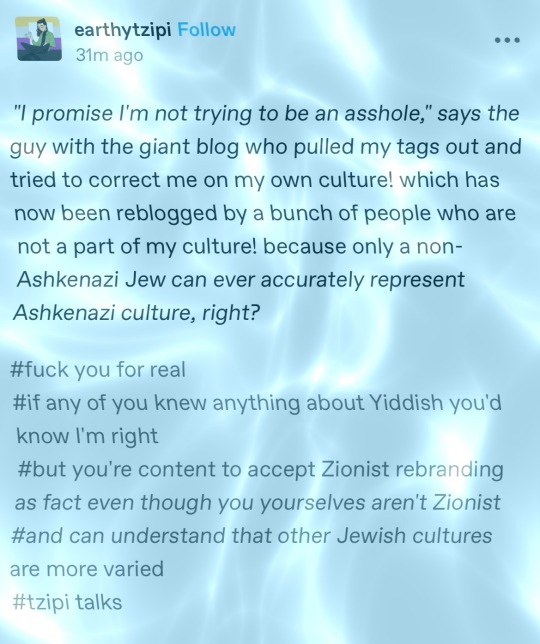
- didn’t try to correct u on ur own culture bud! tried to get u to see that ur own culture is not actually The Only One.
- “because only a non ashkenazi jew can ever accurately represent ashkenazi culture right?” you’ve got some weird aggression toward non ashki jews you should prob unpack.
- again trying to make this abt zionism when i was literally arguing the opposite.
- also i don’t have a “giant blog” lmfao.

- this is funny to me bc u r literally the one who misdefined ashkenazi?????? and attempted to homogenize all ashkenazim under the label of eastern european????? hello?????????
- “irredeemable zionists” yikes bro.
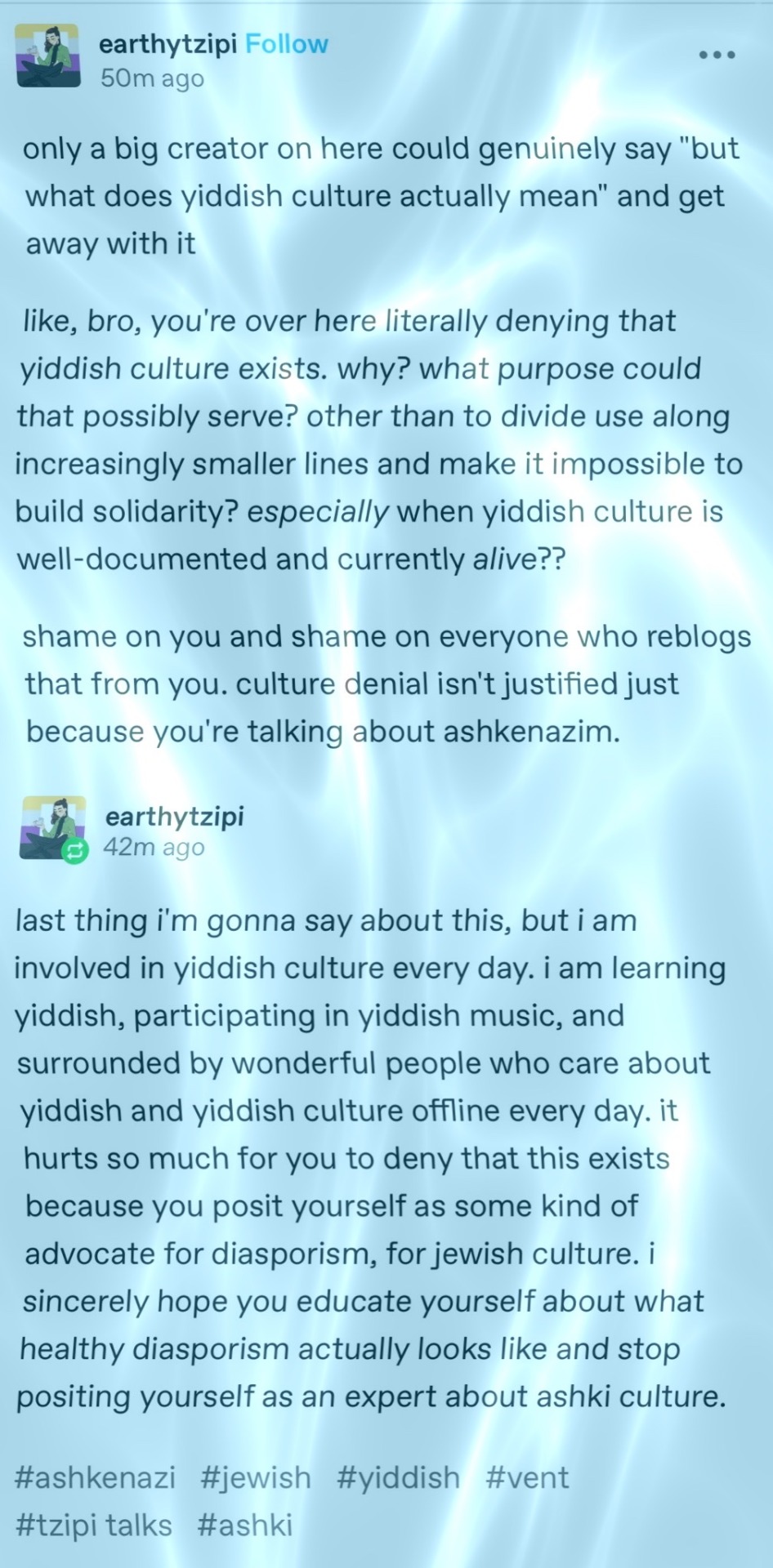
- literally just me when i can’t read and have no critical thinking skills.
- this to me reads like someone who is trying to invert the concept of ashkenormativity and position themself as a victim of non ashki jews. which is absolutely fucking bizarre.
- you’re claiming i’m “denying yiddish culture” while many of your posts actively erase multiple ashkenazi groups from this culture while simultaneously lumping them all in underneath one umbrella eastern european label. like idk how you managed to be so ashkenormative that you managed to erase other ashkenazi jews but it’s almost impressive.
- gee i wonder what it’s like to have ur culture denied surely as a member of a tiny diaspora group that makes up 0.4% of the global jewish population i have no idea what that’s like!
- you are not advocating for diasporism. you are advocating for your culture and your culture only.
anyway, on to my other rant.
if i want to know how to recite a prayer in the ashkenazi rite, i google it. if i want to learn how to speak yiddish, i download duolingo. it’s easy to find these things because people have worked hard to preserve them. and also because ashkenazi jews make up over 60% of the global jewish population and over 70% of the us jewish population.
italian jews, however, including italian ashkenazim, make up 0.4% of the global jewish population. and i couldn’t even find a number for how many of us there are in the us bc there are that few. if i want to know how a certain prayer is chanted in the italian rite, i have to find 70 year old recordings of italian cantors and rabbis singing them for a musicologist who dedicated his life to keeping the italian rite and italki culture alive after it was devastated by the holocaust, bc the only synagogues that still follow the italian rite are in rome and israel. if i want to know how to speak the language my ancestors would have spoken, i have to take a zoom class at oxford at 6am where we study manuscripts from hundreds of years ago. in 1900, there were 20,000 native speakers of judeo-italian dialects. in 2023 there are almost none.
in order to participate in any sort of jewish life where i live, i have to know ashkenazi culture. i have to know the prayers and the songs and the customs. i have to know the food and the language and history.
but y’all don’t have to know mine.
and every time i try to infuse my own heritage into my practice i’m reminded of that. when i make italian jewish food, people don’t see it as “jewish food.” people hear my last name and assume i’m not jewish because it’s not a “jewish name.” when i use italki hebrew, people try to correct me. i frequently encounter other jews who don’t even know italkim exist. so yeah. it is infuriating when i experience constant pressure to assimilate into the dominant jewish culture of where i live only to be a excluded from discussions about that culture because i’m not part of it. i am part of it. i have to be.
ashkenazi culture is beautiful and diverse and i do genuinely enjoy taking part in it. but it is painful to get constant reminders that i don’t really have a choice. it is painful to have people in your own community see your knowledge of their culture as a given but their knowledge of your culture as optional or doing you a favor.
so basically,
you are not being erased by the reminder that jews who are not like you exist.
135 notes
·
View notes
Text
Femme Fatale Booklist:
Books to become your dream girl. This list is curated to unleash the empowered woman inside, tap into your dark feminine energy, and help you succeed in every area of life. Sections are listed below:
Self-Development/Mindset
Seductive Psychology
Femme Fatale/Dark Feminine/Feminist Reads
Business/Finance/Entrepreneurship
Productivity
Mental Health
Physical Health
Fashion & Beauty
Get educated. Expand your mind. Enjoy xx
Self-Development/Mindset:
Mindset: The New Psychology of Success by Carol Dweck
The Magic of Thinking Big by David Schwartz
Atomic Habits by James Clear
You Can Heal Your Life by Louise Hay
Don’t Believe Everything You Think by Joseph Nguyen
The Mountain Is You: Transforming Self-Sabotage Into Self-Mastery by Brianna Wiest
Boundary Boss: The Essential Guide to Talk True, Be Seen, and (Finally) Live Free by Terri Cole
The Confidence Formula: May Cause: Lower Self-Doubt, Higher Self-Esteem, and Comfort In Your Own Skin by Patrick King
The Slight Edge by Jeff Olson
Choose Your Story, Change Your Life: Silence Your Inner Critic and Rewrite Your Life from the Inside Out by Kindra Hall
When You’re Ready, This Is How To Heal by Brianna Wiest
Hunting Discomfort: How to Get Breakthrough Results in Life and Business No Matter What by Sterling Hawkins
The Four Pivots: Reimagining Justice, Reimagining Ourselves by Shawn Ginwright
The Artist’s Way by Julia Cameron
A New Earth: Awakening to Your Life's Purpose by Eckhart Tolle
The Power of Now by Eckhart Tolle
Seductive Psychology:
48 Laws of Power by Robert Greene
Mastery by Robert Greene
The Art of Seduction by Robert Greene
How To Win Friends & Influence People by Dale Carnegie
Power vs. Force by David Hawkins
Femme Fatale/Dark Feminine/Feminist Reads:
Unbound: A Woman’s Guide To Power by Kasia Urbaniak
Pussy: A Reclamation by Regena Thomashauer
Why Men Love Bitches: From Doormat to Dreamgirl―A Woman's Guide to Holding Her Own in a Relationship by Sherry Argov
A Single Revolution by Shani Silver
This Is Your Brain On Birth Control by Sarah Hill
Taking Charge of Your Fertility by Toni Weschler
Regretting Motherhood: A Study by Orna Donath
Invisible Women: Data Bias in a World Designed for Me by Caroline Criado Perez
Women Who Run With The Wolves: Myths and Stories of the Wild Woman Archetype by Clarissa Pinkola Estes
The Second Sex by Simone De Beauvoir
The Ethics of Ambiguity by Simone De Beauvoir
A Room of One’s Own by Virginia Woolf
Women & Power: A Manifesto by Mary Beard
Spinster by Kate Bolick
What French Women Know: About Love, Sex, and Other Matters of the Heart and Mind by Debra Ollivier
Living Forever Chic: Frenchwomen's Timeless Secrets for Everyday Elegance, Gracious Entertaining, and Enduring Allure by Tish Jett
Business/Finance/Entrepreneurship:
Never Split The Difference by Chris Voss
Influence: The Psychology of Persuasion by Robert Cialdini
The 2-Hour Cocktail Party by Nick Gray
The 7 Habits of Highly Effective People by Stephen Covey
Girl On Fire by Cara Alwill Leyba
Women, Work & the Art of Savoir Faire: Business Sense & Sensibility by Mireille Guiliano
Crucial Conversations Tools for Talking When Stakes Are High by Joseph Grenny
Living On Purpose: Five Deliberate Choices to Realize Fulfillment by Amy Eliza Wong
The Earned Life: Lose Regret, Choose Fulfillment by Marshall Goldsmith
The High 5 Habit: Take Control of Your Life with One Simple Habit by Mel Robbins
Building a Second Brain: A Proven Method to Organize Your Digital Life and Unlock Your Creative Potential by Tiago Forte
The Culture Code: The Secrets of Highly Successful Groups by Daniel Coyle
Rich As F*ck: More Money Than You Know What to Do With by Amanda Frances
Rich Bitch by Nicole Lapin
Like She Owns the Place by Cara Alwill Leyba
So Good They Can’t Ignore You by Cal Newport
The First Minute: How To Start Conversations That Get Results by Chris Fenning
Thinking, Fast and Slow by Daniel Kahneman
Build: An Unorthodox Guide to Making Things Worth Making by Tony Fadell
The Hard About Hard Things by Ben Horowitz
The Psychology of Money: Timeless Lessons on Wealth, Greed, and Happiness by Morgan Housel
Productivity:
The Science of Self-Discipline: The Willpower, Mental Toughness, and Self-Control to Resist Temptation and Achieve Your Goals by Peter Hollins
Free Time: Lose The Busy Work, Love Your Business by Jenny Blake
Vision to Reality: Stop Working, Start Living by Curtis Jenkins
Deep Work: Rules For Focused Success in A Distracted World by Cal Newport
Finish What You Start by Peter Hollins
Mental Health:
Becoming The One by Sheleana Aiyana
Attached by Amir Levine
Feeling Good: The New Mood Therapy by David D. Burns
Whole Again by Jackson MacKenzie
Take Your Lunch Break by Massoma Alam Chohan
Stop Overthinking by Nick Trenton
Codependent No More by Melody Beattie
Designing the Mind: The Principles of Psychitecture by Ryan A. Bush
Radical Acceptance: Awakening The Love That Heals Fear and Shame by Tara Brach
Recovery from Gaslighting & Narcissistic Abuse, Codependency & Complex PTSD by Don Barlow
Adult Children of Emotionally Immature Parents: How to Heal from Distant, Rejecting, or Self-Involved Parents by Lindsay C. Gibson
Inner Child Recovery Work with Radical Self-Compassion by Don Barlow
What Happened To You?: Conversations on Trauma, Resilience, and Healing by Bruce D. Perry & Oprah Winfrey
Atlas of the Heart by Brené Brown
Physical Health:
The China Study by T. Collin Campbell
The Blue Zones by Dan Buettner
How Not To Die by Dr. Michael Greger
Befriending Your Body by Ann Saffi Biasetti
Brain Over Binge by Kathryn Hansen
The Power of Self-Discipline by Peter Hollins
Fit at Any Age: It's Never Too Late by Susan Niebergall
French Women Don't Get Fat by Mireille Guiliano
The Archetype Diet by Dana James
Fashion & Beauty:
The Lucky Shopping Manual: Building and Improving Your Wardrobe Piece by Piece by Andrea Linett & Kim France
Dress Like A Parisian by Alois Guinut
Parisian Chic by Ines de la Fressange & Sophie Gachet
Why French Women Wear Vintage: And other secrets of sustainable style by Alois Guinut
Ageless Beauty the French Way: Secrets from Three Generations of French Beauty Editors by Clemence von Mueffling
Skincare: The Ultimate No-Nonsense Guide by Caroline Hirons
#femme fatale#dark femininity#dark feminine energy#high value mindset#high value woman#hypergamous#feminine energy#female manipulator#the feminine urge#hypergamy#female empowerment#female power#it girl#that girl#girlblogging#gaslight gatekeep girlboss#motivational#booklover#atomic habits#art of seduction#the 48 laws of power#robert greene#french girl#level up#healthy habits#productivity#glow up#femmefatalevibe#book rec list#book rec
2K notes
·
View notes
Text
wtf just happened?
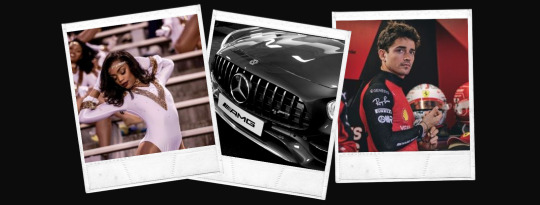
Pairing: Charles LeClerc x Hamilton!OC
Genre: Slice of Life; Fluff
Word Count: 1.8k
Warning: Mild "slander" of French speakers. Language. (Mild)
Rating: PG-13
Author's Note: N/A

“Iman.”
Nothing.
“Iman.”
More silence.
“Iman Marie!”
Ignoring the shouting was her plan, but that was when it was from just outside her room. That last one was right in her ear, making her jump and then without looking, she uses the pillow next to her to hit Logan in the head.
The man truly took annoying little brother to heart. And just like any sister she wanted to kill him. Not kill him dead, but just enough so he would leave her alone. Even in the midst of her angst she didn’t want the idiot dead, she would sadly miss him very much.
“Ow!” he says.
“You should have left me alone,” she mumbles into her other pillow.
“No, we have plans. And you moping around like a dork isn’t going to change that. I don’t even know why since you wanted this.”
Iman pushes herself up a little and turns her head at a speed that should hurt her neck. Her eyes narrow on her friend who looks annoyed and amused as he rubs his face. Her accuracy clearly worked in her favor. However, she can’t find it in herself to be happy about that.
“Why can’t you just leave me alone?” she whines.
“Because you’re being dramatic.” Logan rolls his eyes as he says it and moves out of range for her to throw anything at him.
Not that she plans to throw anything else at him. Iman can’t find the energy to attack him for what he said. Partly because she knows it’s true, even if she does glare at him for it.
There are few times in life she’s felt more like a big baby than now. She’s capable of handling her emotions. Lewis always made it clear that she was allowed and should always accept how she’s feeling because those feelings aren’t wrong, but that she has to temper her reactions. To be fair most of that had to do with her wanting to fight a racist or anyone who had some reach of a comment to say about him, but it wasn’t the only place he ever applied that kind of thing. He always said he knows the influence he’d have on her life and he wanted to ensure that she didn’t have to learn some of the hard parts like he did. Which she appreciated.
But goodness it didn’t help at the moment.
Charles Leclerc kissed her a little less than twenty-four hours ago. Something she’d hope would happen sooner rather than later. Something she was going to try to make happen herself because she was tired of playing whatever game it was that meant she withheld her feelings for the man. And because everyone who knew her was annoying and pestering her.
Now she’s finally experienced it, and her reaction was to play it cool in his face and then put her phone on Do Not Disturb so he couldn’t reach her to talk about it. Something she knows has happened because he’s reached out to Lewis, Logan, Alex and Lily to make sure she’s okay.
More than anything she wishes the urge to vomit stemmed from thinking that Charles wants to tell her that he regrets the kiss. That it meant nothing and that he wants to continue being friends. Or not friends at all. But she doesn’t have that voice in her head. Instead, the one she’s dealing with focuses on what comes next. There are obvious answers, but something about it is stressing her out.
Something she’s wanted for a while now lacks the joy it deserves and it’s driving her up a wall.
She’s acting like Charles. She’s not an overthinker and yet that fucking Monégasque has her in shambles. How dare a French speaking man do this to her at all.
A pillow slams into her face and her head whips back and then forward at a speed that could probably induce whiplash. Logan is sitting on her bed with a pillow in his hands. It’s angled back like he plans to do it again, but then he sets it down.
“What the fuck, Logan?” she shouts.
“Mate, you were zoning out.”
“So, you hit me with a pillow?”
“You hit me first!”
Her hand twitches and moves toward another pillow and he reassumes the position prepared to attack her too.
“I didn’t believe you.”
“I told you.”
The voices draw her attention from her stare down with Logan to her doorway. In it stands Lewis and Sebastian. Iman is familiar with the man and feels comfortable around him, but his presence confuses her so much that the urge to throttle Logan leaves her.
“Hi Seb,” both her and Logan say.
“Hello. Did we walk into a war?” he asks.
“No.”
Lewis rolls his eyes. “Then what did we walk into?”
“Her being stupid.”
Both pillows fly without a word and it’s a flurry of them hitting each other and failing to dodge. It only lasts for what’s probably seconds and both of them have made it off the bed and onto the floor with
“Okay, separate kids.”
Like creepy twins they go from glaring at each other to Lewis and again he rolls his eyes at them. Iman and Logan put the man through a lot, so he’s used to their brand of nonsense.
Sebastian is barely concealing a laugh as he watches all this and Iman fights not to turn her irritation on him. She’d laugh too if she was watching this mess.
Lewis claps his hands and like well trained dogs they release their pillows and sit on her bed. She’s still glaring at her brother, but she’s toned it down.
“You stop hitting her with pillows. You know how she gets.” He points to Logan.
“She started it. I was just defen…” A single look from Lewis shuts him up and Logan huffs, but nods.
“And you.” As he says it all three sets of eyes are intently on me. “Pull it together, yeah. The first few hours were fine, but this is a bit much. I won’t tell you how to feel, but you’re happy about it, he’s happy about it. Stop being a dunce and do something about it. Man is blowing up my phone.”
“Mine too,” Seb chimes in.
“You texted him first,” Lewis says.
A grin that Iman considers evil, because it’s only ever present when he’s up to no good, spreads across Sebastian's face. The man likes to be in the know and he’s fond of his former teammate, so his self-insertion isn’t surprising in the least.
However, as quickly as that look of mischief comes, it goes. Sebastian is still smiling, but there’s a seriousness to his demeanor that makes Iman a little uneasy.
“Don’t hurt his feelings or yours.”
Then they’re both gone.
Iman is unsure of what to do or say, so she just sits there. A million thoughts bubble inside of her head, but she blocks them all out. Lingering on even one of them could lead her back to where she was minutes ago, and Lewis is right. He’s often right.
Logan exhales. “You know I just want you happy, right?”
“Yeah.”
“So be happy. You’ve been pining after the guy for a while now. He’s finally made it clear he’s ready and available. That he feels something for you, even if you don’t fully know what that is yet. Don’t play around and overthink it. You’ll kick yourself for it later. Hell, I know you’re doing it now.”
She nods but says nothing. Still doesn’t know what to say, but she does lean her head down on Logan’s shoulder. The gesture is one of the usual casual affection, but also a silent thank you. He knew what to say and she knew that before he’d even shown up at her place, thus her ignoring his pestering to begin with. Being stubborn is on brand for her.
He pats her head and then abruptly he stands up, leaving her barely any time to adjust herself so she doesn’t fall over. The glare is back on her face, but Logan just smiles as if he doesn’t have a care in the world.
“Now get up and get ready. We’re already running late and you’re the one who begged me to come try that new place with you.”
She rolls her eyes, but nods.
Logan heads toward the door, but then turns around. He tosses something at her, and she flinches a little, but is calmed by her phone landing on her legs.
“Oh, and text him back.”
Then he too is gone. Probably to raid the fridge.
Iman’s gaze doesn’t leave the phone in her lap even as a retort is on the tip of her tongue. She doesn’t hate when Logan’s right, however when she’s in a mood it can be annoying. And the addition of him, Lewis, and Sebastian Vettel, all calling her out takes it to another level.
They’re right and she wants to stop feeling like such a mess over it. All these emotions are overwhelming, and the real problem is she can’t isolate any of them so they can be tackled one by one. Hell, she can’t even get them down to pairs.
What is obvious to her is that she’s happy and hopes that a step has been taken in the right direction. That this will hopefully lead to her no longer having to deal with getting her hopes up just for another girl to show up on his arm. That phrasing makes it seem like it’s constant and he’s never been single for a second between girlfriends, but even when there are months between them it always feels like it was nothing more than a day for her.
A soft scream escapes her lips, and she falls back onto the bed. She’s overthinking again and it’s close to sending her into a spiral. The last thing she needs is that, especially when he’s part of the summer vacation group. This putting a damper on things is out of the question and she refuses to be awkward like some little kid dealing with their crush.
With a sigh she sits up, tosses the phone on the bed, and gets up. Without a second glance she walks into her bathroom and closes the door.
####
Charles stares at his phone like he’s done for the past few hours. He tried to tell himself that Iman drank quite a bit the night before so she might still be recovering. Or that she wants a chill day and is away from her phone, something he’s witnessed first-hand. Hell, he’s even thrown in that maybe she’s just busy despite knowing that Williams refuses to call in their people on their days off without an emergency and both drivers have told him there hasn’t been one and that she’s fine.
Which means she’s intentionally not responding to him. And he is trying so hard not to seem desperate that the possibility of her regretting kissing him is all he can think about. Something he’s reassured himself that isn’t true. Something his brothers and friends have told him is a dumb idea to even entertain. But he can’t help but wonder if he fucked up when she won’t respond to him.
As he sits there, he tries to tell himself he needs to get ready for the early dinner he promised a group of his friends that he’d attend. But he can’t break his eyes away. Which he thinks is fucking ridiculous. That he is yet again being ridiculous.
So, he closes his eyes and takes a breath. Then without opening them he gets up from the couch and turns away from it and his phone. His eyes open and he takes a step. His phone makes a high-pitched sound and vibrates like crazy.
Like a man possessed he turns around and snatches it up. It’s unlocked before he can truly think to do it and then his eyes are glued to the message, his body sitting without him telling it to.
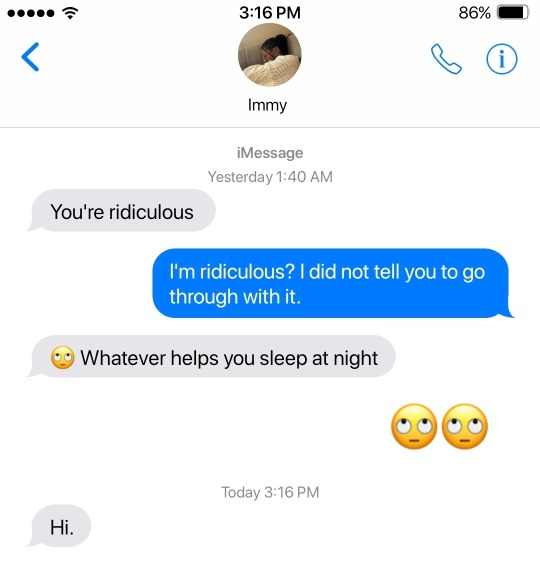
Air leaves his lungs and Charles melts into his couch. His entire body relaxes, and he feels the corners of his lips inch upward, something they hadn’t done since he realized Iman was ignoring his attempts to reach out.
His friends would never let him hear the end of it if he ever admitted how much that simple greeting did for him.
#charles leclerc x black reader#charles leclerc x reader#f1 x reader#f1 x black!reader#formula one x black reader#formula 1 x reader#formula 1 x black!reader#formula one x reader#charles leclerc fan fiction#charles leclerc fanfic#f1 fanfic#f1 fan fiction#f1 imagine#formula one x oc#formula 1 x oc#charles leclerc x oc
73 notes
·
View notes
Note
What about Grandma then?
In recent days, that Barbour issue has been discussed in several corners of this fandon, as you said. Well, the day before yesterday Garance was posting stories showing off his Barbour coats...Obviously those two also follow the topics discussed on Tumblr.
🤷♀️
Dear Garance Anon,
You will have to forgive me for the very, very late answer. I wanted to give it my full, undivided attention, because I believe we never spoke seriously about Mrs. Mariline Fiori, aka Garance Doré.
The short answer to your comment is 'oh, but we know they do, as we know they are not the only ones'. Unlike S&C, though, the McGrandmas might see us as a free, useful toolbox of sorts, where readily available ideas congregate. Remember they have deliberately calibrated their public couple personas on exactly what SC are unable and/or unwilling to give/show this fandom. To some extent, it works and, as any good Frenchwoman, Garance understood she was savvy to play the atout charme joker card. Which is exactly what she does - also, being French, she knows exactly what type of European public is instantly attracted to the Barbour reference: a public whose wallets she needs.
But as I just said, your post made me think about Mrs. Doré. Who is she, really? So, sorry, Anon, if I use you as a springboard for my musings.
She was, as I said, born Mariline Fiori, on May 1st (same day as JAMMF, LOL) 1977, in Ajaccio, Corsica's main town and birthplace of Napoleon Bonaparte. Not a Corsican, though (same as Napoleon, LOL): Italian father, French/Algerian mom. People who left Algeria when it became independent, after the Evian Peace Accords, and whom the metropolitan French still call, to these day, 'pieds-noirs' (literally and quite derogatorily, 'black feet'). Her family's social status is, however, a bit unclear, as Mrs. Fiori successively played with her personal story in interviews, in what the French also sarcastically call 'des petits arrangements avec la vérité'/ a bit of tinkering with the truth.
In this 2019 interview to Elle UK, for example, her parents are described as owning a restaurant in Corsica (https://www.elle.com/uk/life-and-culture/a29758314/garance-dore-original-influencer/):

But in another 2013 interview to The Talks, her mother was a shrink (https://the-talks.com/interview/garance-dore/):

Also, for the sake of clarity:
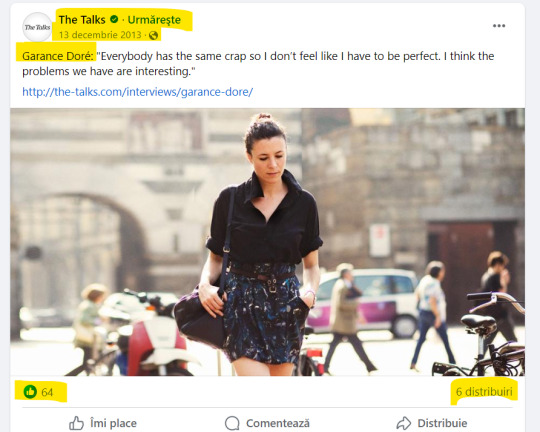
Oh, well: different country, different crowd/market, different agenda and perhaps older and wiser when talking to Elle UK, you would think?
Not necessarily and still a divisive figure for the international press/blogosphere. People did not appreciate her frequent flying and luxury travels during COVID, for example, along with her 'white, bourgeois woman entitlement'. Both in New Zealand...

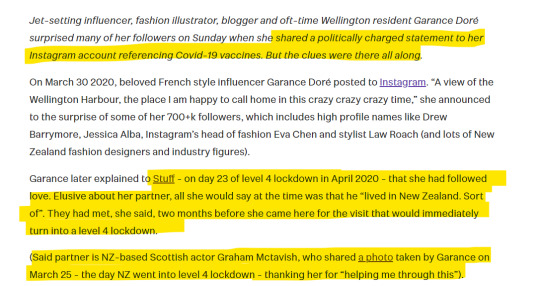
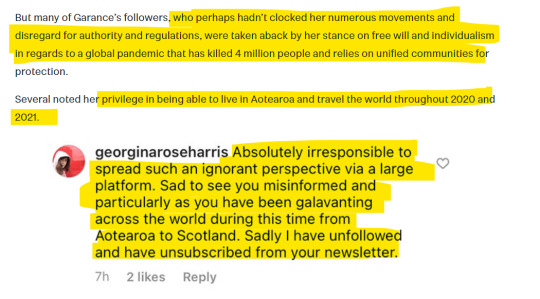
(Source: https://www.ensemblemagazine.co.nz/articles/garance-dore-new-zealand - I think you should read the entire article, as it is absolutely enlightening, also something I wouldn't go polemic about, you make up your own mind, really).
...and in France, where they apparently are not very fond of her 'cult of personality' approach to social media, to say the least:
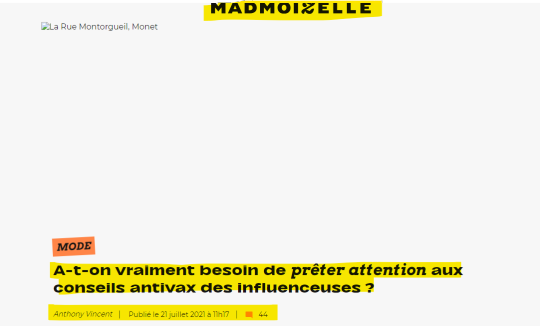
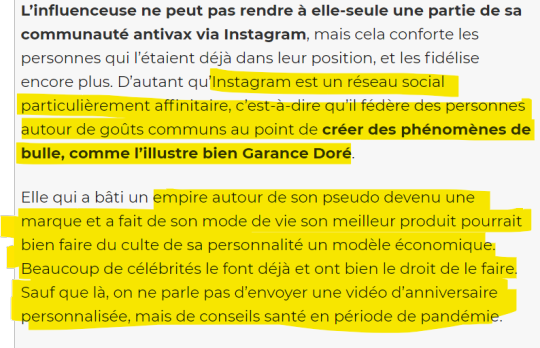
(Source: https://www.madmoizelle.com/a-t-on-vraiment-besoin-de-preter-attention-aux-conseils-antivax-des-influenceuses-1145916 Non Francophones could use Google Translate, but considerably lose in doing so the ferocity of the writing - but then, again, the French press is particularly sarcastic & ferocious, when set against someone or something. I love them to bits.)
The translation is clear, and I deliberately did not insist on the political stance of the article, whose title gives a straightforward idea: 'Do we really have to pay attention to the influencers' antivax advice?':
'This influencer cannot singlehandedly convert a part of her fans to antivaxing, via Instagram, but this comforts those who already thought so and keeps them even more hooked. This is because Instagram is a social media whose model heavily relies on shared affinities, meaning that it congregates likeminded people and creates bubble phenomena, of which GD is a good example.
GD, who built an empire around her handle which she turned into a brand and transformed her own lifestyle into her best product might very well turn her cult of personality into an economic model. Many celebrities already do so and are perfectly entitled to. But in her case, we are not talking about sending a birthday personalized cameo, we are talking about dispensing health advice during a pandemic.'
Truly, Ha-wa-wee 2.0 sounds like kindergarten compared to the above and never made it so far and wide in the international press. But hey, don't we know, double standard is the law of this land.
But to cut the story short, because it's 5 AM in here and we'd be talking about Mrs. McGrandma until tomorrow evening, do we really imagine someone so well versed in the ways and means of social media not following Tumblr?
Yeah, thought so, too.
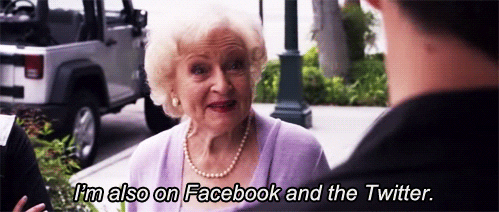
85 notes
·
View notes
Text
Favorite Historical Architectural Styles
Since I've done my favorite historical fashions, I thought it would be fun to do historical architectural styles too. I want to write more about architecture too, but I've started thinking should I do a separate blog for architecture and architectural history or should I just do it all here? I think it would be better in a way that I wouldn't have to worry if anything I want to write is too far from the actual topic of the blog, but then again, there is a lot of overlap, especially when it comes to Arts and Crafts movement (which I'm currently writing my thesis about and which I definitely will talk a lot about), and also I would have to manage yet another blog.
Anyway, I'll again do this from oldest to newest. I will limit myself to western styles (except when we get to Modernism all styles are very international), even though there's a lot of non-western styles I enjoy, but it's what I know most about.
Perpendicular Gothic


I love Gothic architecture in general and the several first entries will be my favorite sub-styles of it. I love the the way Gothic Cathedrals try and so often succeed to feel like forests. I love how the structural elements are used to create the aesthetic. I love the organic visual elements. I love that it's such a unique style in Western architecture. And I love the amazing craftsmanship that went into it.
I'm particularly a fan of English Gothic because of it's insanely beautiful and complex ribbed vaults. From English Gothic my favorite though is the Perpendicular style, which was basically the English late Gothic. It's characteristics can be seen in the second pic. It has the stretched arch and the very flowing and organic traceries. I do include here the rest of English Gothic too, since even though the Perpendicular style is my favorite of them, all if it is still one of my Gothic favorites.
German Late Gothic


As it's becoming clear I love Late Gothic architecture in general the most, and in the geographical axis I also love German Gothic. Early and High Gothic were mainly divided into French and English styles and the French style dominated in the continent, just being altered a little to the local building traditions outside of France, but during late Gothic it diverged much more strongly into different styles.
German Gothic also has beautiful complex faulting (though less insane than English) and it also has that same pursuit of massive height French Gothic has. Those combined with that Late Gothic's more streamlined flowing and organic aesthetic, some of the German Late Gothic cathedrals really sell that feeling of standing in a forest.
Finnish "Gothic"


I have a soft spot for the Finnish Medieval stone churches, which are not nearly as sophisticated or detailed as the other European counterparts, but still made with beautiful craftsmanship and they have some cool own features. It's very far from the European Gothic traditions, as you can see, but that's still the influence, hence Gothic in scare quotes. I love the simple outward appearance with the exposed thick stone walls, the details of the gable that worked as the calling card for the building master and the very steep roof. Like everywhere at the time, the roof in these has wooden structure, which is frankly super cool. It was not a simple engineering problem to make a roof that steep and massive at the time, but the structure works so well there's 600 year old roofs with the original logs still working perfectly well. I also really love the original medieval murals in them, which were painted over during the Reformation (you can't have color in a Lutheran church damn it), but thankfully some of them have been restored from under the paint.
Finnish "Renaissance" Log Churches


Renaissance also didn't land in Finland similarly as it did rest of the Europe. When Renaissance was going on in Europe, they still were building those "Gothic" churches here. These log churches were based on Scandinavian version of the Renaissance church, but they didn't really look like Renaissance churches, and were kinda it's own thing continuing a lot of the aesthetics from those Gothic churches. This is a highly specific style, but I just think they are so cool and pretty? Like they really made a CUPOLA out of log.
Arts and Crafts Movement



Arts and Crafts Movement didn't have exactly a style, rather a design philosophy that was more important than specific style. There's of course a lot of stylistic similarities in the works of the different members of the Movement, because they had overlapping sources of inspiration and were influenced by each other, so we can think of it as a style. I could, have and will talk about them for hours, but briefly now: It was a moment in latter half of the 19th century and early 20th century and their goals were reviving craftsmanship skills and professions, socialism, opposing industrialism and abolishing the hierarchy between fine arts and applied arts. They were very much influenced by Medievalism and Gothic art and architecture, though unlike Gothic Revivalist, they took more from the guiding principles than the aesthetics. They basically started Modernism and lay ground to all the Modernist architecture's main principles, like form follows function.
Art Nouveau


Art Nouveau was directly influenced by the Arts and Crafts Movement and was the first mainstream Modernist style. I especially love the more toned down Finnish Art Nouveau, or Jugend as it's called here, but I do love the style more broadly too. I'm not that into those almost Baroque style versions of it though, with barely any straight lines. I love the round doors, the stylized floral patterns and the use of light.
Organic architecture



This has to be my favorite modernist/post-modernist (?) style. It's direct successor of Arts and Crafts movement and it's also more of a design principle than a unified style. There is some stylistic similarities, but it is stylistically very diverse philosophy. It was most prominent during the 20th century, but it always stayed in the sidelines, though there are still architects who might be considered practicing organic architecture. Organic architecture is all about living in harmony with nature, taking inspiration from it, designing the building to fit the building spot and the surroundings, extra care taken in to preserve the nature already there, and using local natural materials when possible. My favorite architects are Raili and Reima Pietilä, who were most prominent organic architects in Finland. (I almost moved into apartment designed by them, but it was in pretty bad condition, so it wouldn't have unfortunately been worth the price.)
Brutalism


I know it's not for everyone and it's not easy to make it work but when it works, it really does. It was born in 1950s during the reconstruction era. Brutalism is not just concrete though. The point is to show the raw materials and the structural elements. Technically a lot of Gothic and Arts and Crafts architecture is then brutalist. Timber frame architecture? Also brutalist. I'm only half joking, of course the style itself is also very bare and, well, brutal, but I love it for the same reasons. I really love bare textures of materials and exposing the materials of the structural elements. And I do actually really like the texture of concrete. Though I will say concrete is destroying our world and we should use it as little as possible. But we should also protect old buildings and keep using them rather than built new ones, so I feel fine admiring the old brutalist buildings. The best brutalist buildings combine materials very intentionally and make works of art with the light.
Bonus - Favorite contemporary architecture: Traditional methods



As we're living in the post-modern times, there's not really unified and specifiable styles or architectural ideologies anymore. They all kinda flow into each other and architects don't organize themselves into clear groups based on style and design philosophy. So it's hard to put into words the style I like in contemporary architecture. There's been growing interest in studying traditional structures and methods, learn from their sustainability and incorporate them into contemporary architecture. They are techniques that have been developed through trial and error on the span of centuries, so we really don't have to reinvent the wheel here. Traditional methods of a given area have also been developed for that area and it's climate, from the materials available there, so they also push us to use local materials. Typically these traditional structures are very simple, often made from solid material, which makes them easier to built without construction error (a huge problem in modern structures), and easier to fix and maintain, when inevitably there is issues. Also they are beautiful, definitely more so that steel and glass. I love solid brick structures, log structures, timber frames, natural stone, rammed earth and all of them, especially when these beautiful materials are left bare.
#architecture#architectural history#historical architecture#history#art history#modern architecture#gothic architecture#brutalism#arts and crafts movement#art nouveau
536 notes
·
View notes
Note
About your post regarding the union talking about the CC’s intention :
First like you said yourself, and at least from what I’m aware (and I hope it is the case), no CCs have actively encouraged harassment against anyone involved in this.
Now, I’m assuming what the union is referring to are statement such as
-Aypierre who has tweeted against doxxing (not a bad thing obviously) and generally defended Quackity. Obviously he isn’t encouraging harassment intentionally at all, but fact is that by doing so it fueled a lot of hate against the admins and also french fans who speak in favor of them.
-Quackity’s streams in which he has talked multiplie time about « people with bad intentions », people who wanted to see the downfall of the server etc. Again no intent to directly encourage harassment but this still lead to a lot of hate being thrown the admins way.
In both cases, the union isn’t saying that they’ve actively tried to fuel the hate, just that CCs should be mindful of what they say and how they word it, because when you have a big community the consequences can be and have been quite intense. Of course CCs aren’t guilty by proxy of the bad behaviour from their fans, the union is just saying that they should be careful with their influence. (Ideally this applies to everyone, not just influencers, but the bigger your reach is, the more careful you have to be)
I’m sorry this is long, and I hope this could clear things up a bit ✌️
As much as I wish I could agree with you, the union really isn't just gently advising CCs to be careful with what they say.
You say that the union doesn't claim that they've actively tried to fuel hate, and yeah sure maybe they aren't saying that about Quackity, but the entire reason I made that last post was because their wording did actually just straight up imply that some unnamed CCs have actively tried to fuel hate. That was the entire issue.
They also made no mention of CCs or Quackity "needing to be mindful of what they say;" in fact they didn't really offer any constructive suggestions of the sort that could be interpreted in that way whatsoever. The only thing they told them to do was apologise, clearly implying that they believe Quackity and the unnamed CCs are to a certain extent at fault for the harassment.
#you and i most certainly have two very different interpretations of the post; one much more favourable towards the union than the other.#while i accept that difference in opinion is not inherently wrong nor should it need to be fixed in every situation#i do encourage you to reread the post at hand and realise the bias that you have unknowningly pushed into your interpretation of the words.#I'm trying to be polite and not rude; forgive me if i come across as blunt or harsh ❤️ i am never striving to upset anyone#just simply to be clear consise and truthful#qsmp#admingate#qadmin situation
56 notes
·
View notes
Text
YN Tomlinson
Our Story Masterlist
Summary: An insight into YN's life.

Background Information:
Birth Name: YN Olivia Tomlinson
Born: 13th of April 1994
Origin: Doncaster, England, UK
Occupation: Hair Stylist, Fashion Influencer, Owner of Styles Fashion
Siblings: Louis Tomlinson (brother), Charlotte "Lottie" Tomlinson (sister), Félicité Tomlinson (sister), Daisy Tomlinson (sister), Phoebe Tomlinson (sister), Doris Deakin (sister), Ernest Deakin (brother)
YN Olivia Tomlinson, born on the 13th of April, 1994, is an English hair stylist and fashion influencer. She is also the founder of the fashion company, Styles Fashion.
YN was born and raised in Doncaster, South Yorkshire. Her older brother is singer Louis Tomlinson. She was raised with Louis and four younger sisters: Charlotte, Félicité, and twins Phoebe and Daisy. Her parents divorced in 2011. YN has two younger siblings, twins Doris and Ernest, who were born in 2014, from her mother's relationship with Dan Deakin.
Like her brother, YN attended The Hayfield School and later on Doncaster College where she studies Hairdressing and Beauty Therapy, which are both located in Doncaster.
YN began travelling with her brother, Louis and boyfriend, Harry on tour with their band One Direction when she 18 as the band's hair stylist and make up artist Lou Teasdale's assistant. She worked as Lou's assistant from 2013 until 2015, during their Take Me Home Tour, Where We Are Tour and On the Road Again Tour, and for the bands promotional appearances during those years.
In 2016, she collaborated with several fashion brands including ASOS, Adidas and Zara. Later in the year, YN debuted the collaborative clothing collection with Adidas, where her brother Louis and boyfriend Harry both attended.
In 2017, YN released her first book, Styles: Fashion By Me. The book includes over 50 different fashion outfits and styles. A year later in 2018, YN launched Styles Fashion, her own company and clothing line, including clothing items that she designed herself. In June 2019, alongside her sister Lottie, she released a collaboration collection with fashion brand In the Style.
YN began dating her brother's bandmate, Harry Styles, in 2011. The couples relationship was exposed after a photo was taken of them kissing, at Harry's childhood's friend party. Despite their relationship, it is still clear that Harry and Louis's friendship has remained strong.
Speculations began that the pair may have split in 2018 when YN did not attend Harry's Manchester or London dates during his Live On Tour show. The pair were not seen together until December 2018, when YN posted a photo on her Instagram of the pair at her family's home in Doncaster.
In 2019, Harry released his studio album Fine Line, where fans were quick to conclude that the couple did in fact split the previous year. The album is a mixture of happy and sad times that the couple experienced and Harry said in his interview with Zane Lowe "The times when I felt good and I felt happy, we're the happiest I've ever felt in my life, and the times I felt sad was the lowest I ever felt in my life". In the same interview, Harry also confirmed that the voice played at the end of the track Cherry is YN, which was from 2014 when she was trying to learn how to speak French.
YN has featured in some of Harry's music video's, including Lights Up, Watermelon Sugar, Adore You, Treat People with Kindness, As It Was, Late Night Talking and Daylight.
After the loss of her mother and sister, YN has been open about her anxiety and has since been an advocate for mental health and currently is an ambassador, alongside her sister Lottie, for the bereavement charity, Sue Ryder.
Following the announcement of her sister, Lottie's, pregnancy in 2022, YN launched a maternity clothing line, quoting in her interview "My sister begged me to start working on maternity clothes as soon as she found out she was pregnant...how could I say no?".
YN has joined Harry on his Love On Tour tour, from 2021-2023. Harry announced during one of his Wembley shows that he had proposed to YN at the venue that very same day. Despite being on a world tour, YN still used her platforms to work in partnership with brands, but most importantly, provide the fans with the updates they wanted.
Tag List: (let me know if you would like to be added) @pansexualwitchwhoneedstherapy @harrys-flower @platinumbarbie143 @frickin-bats @harrysbbyh0ney @chronicallybubbly @goldensunflowe-r @walkingintheheartbreaksatellite @kaverichauhan @peterholland04 @panicattheuc @indierockgirrl @or-was-it-just-a-dream @hittiesontour @bunnyharold @fanfictioncafe @lilfreakjez @jerseygirlinca @iamahallucinationnn @theekyliepage
#harry styles x reader#harry styles#harry styles x y/n#harrystyles#harry styles fanfiction#harry styles x you#harry styles fanfic#harry styles series#harry styles writing#one direction#harry styles x fem!reader#harry styles x tomlinson!reader#harry styles x oc#harry x reader#harry x yn#harry x y/n#harry x you#harry styles fic#harry styles series masterlist#harry styles masterlist#harry styles imagines#harry styles imagine#louis tomlinson#niall horan#zayn malik#liam payne#harry 1d#one direction imagine#one direction fanfiction#tomlinson!yn
155 notes
·
View notes
Text
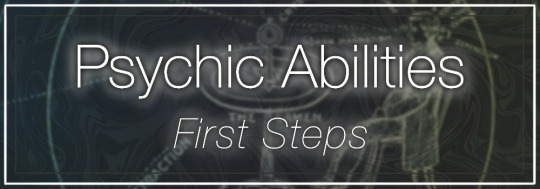
Title: Psychic Abilities: First Steps
Suggested Reading
Biases in Witchcraft
Dualities
Psychic Abilities & Mental Illness
Shadow Work: First Steps
Energetic Senses
The Subtle Body
Warding Basics
*- Closed or Semi-closed cultures/practices
This article uses yellow text, which may be difficult to read outside of dark-mode.
Understanding Psychic Abilities
Psychic abilities often refer to skills or talents enabling individuals to gain information or influence beyond the scope of human senses or scientific understanding. Such capacities are frequently posited to transcend the boundaries of time, space, and matter. While they can be classified into various types – such as clairvoyance (perceiving remote or hidden information), telepathy (transmitting thoughts), and precognition (predicting future events) – the mechanisms underpinning these phenomena remain the subjects of controversy and speculation.
Historical Perspectives
Throughout history, diverse cultures have recognized and integrated the notion of psychic phenomena into their daily lives and spiritual practices. From ancient civilizations like the Greeks and Egyptians, who consulted oracles and seers for guidance, to indigenous tribes who believed in the power of shamans and medicine people to communicate with forces beyond human perception, psychic phenomena have occupied a significant niche.
In the medieval period, psychic occurrences were often intertwined with religious or supernatural explanations. Those who claimed to possess these abilities were either revered as divinely gifted or, conversely, vilified and persecuted for heresy or witchcraft. Notably, the Renaissance and Enlightenment periods began to scrutinize such claims, emphasizing empirical evidence and rationality. This shift led to a decline in the public acceptance of psychic phenomena as mere superstitions or the result of charlatanism.
Modern Interpretations
In contemporary times, the debate surrounding psychic phenomena has bifurcated into two dominant perspectives: the skeptics and the proponents.
Skeptics, often armed with a scientific background, posit that claims of psychic abilities lack empirical evidence. They argue that such phenomena can be explained by cognitive biases, logical fallacies, or mere coincidences. For instance, the confirmation bias might lead someone to remember only the instances when a psychic prediction was accurate and dismiss those when it was not. They also highlight instances where purported psychics have been exposed as frauds, using tactics such as cold reading to feign genuine abilities.
On the contrary, proponents assert that the existence of psychic abilities is a genuine and untapped dimension of human potential. While acknowledging that fraudulence exists, they argue that there are genuine cases that defy conventional explanations. They contend that science, in its current form, may not be adequately equipped to understand or measure these phenomena. Some postulate that advancements in neuroscience, consciousness research, or quantum physics might one day elucidate the enigmatic nature of psychic abilities.

Types of Psychic Abilities
Clairvoyance
Derived from the French words "clair" (clear) and "voir" (to see), clairvoyance essentially translates to "clear seeing." Clairvoyance refers to the claimed ability to gather information about an object, person, location, or event without any known humanly means. This phenomenon is often described as receiving visual information in the form of symbols, colors, or visions. Throughout history, many societies have revered clairvoyants as powerful figures. In some cultures, they played significant roles as advisors to rulers or as mediators between the physical and unseen worlds. Contemporary society, with its emphasis on empirical evidence, often views clairvoyance with skepticism, yet there remains a persistent cultural fascination with this ability. In many spiritual traditions, clairvoyance is seen as a heightened state of consciousness, a gift or a skill that connects the individual with higher dimensions or spiritual guides.
Telepathy
Stemming from the Greek words "tele" (distant) and "pathos" (feeling), telepathy can be understood as "distant feeling." Telepathy is the purported transmission of information between individuals without using known human sensory channels or physical interaction. It encompasses the transfer of emotions, thoughts, or even complex ideas. From ancient legends to modern science fiction, telepathic communication has captured the human imagination. While empirical research in telepathy remains inconclusive, it is a recurrent theme in popular media, underscoring the human yearning for connection. Mystic traditions may regard telepathy as a manifestation of universal interconnectedness, suggesting that at a deep level, all consciousness is one and separateness is an illusion.
Precognition
The term derives from the Latin "prae" (before) and "cognitio" (getting to know), effectively meaning "foreknowledge." Precognition involves knowledge or perception of future events before they occur, without any logical basis for such foreknowledge. This might manifest as dreams, feelings, or intuitions. Predicting the future has been a universal human pursuit, with precognitives often serving crucial societal roles as prophets, oracles, or seers. However, contemporary views on precognition are split, with skeptics pointing to cognitive biases as explanations. Many mystical traditions suggest that time, as humans perceive it, is an illusion. In such a framework, precognition might be understood as accessing timeless dimensions where past, present, and future coexist.
Claircognizance
"Clair" (clear) combined with "cognizance" (knowledge) indicates "clear knowledge." Claircognizance denotes an intuitive ability to just "know" something, without any logical basis or prior information. Individuals with this ability might suddenly know facts, insights, or understandings without knowing how they acquired them. The concept of inherent knowledge or insight is recognized in many cultures, often attributed to divine inspiration or profound intuition. However, in a world valuing empirical data, such spontaneous knowledge can be met with skepticism. Some spiritual interpretations posit that claircognizance is a connection to universal knowledge or the collective consciousness, suggesting an innate ability to tap into an omniscient source.
Clairsentience
Combining "clair" (clear) with "sentience" (feeling), clairsentience means "clear feeling." Clairsentience refers to the ability to physically feel or emotionally sense the energy or emotions of people, places, or events. This might manifest as gut feelings, sudden mood changes, or physical sensations. Empathy and heightened sensitivity have been recognized across various cultures. While some view clairsentience as a heightened form of empathy, others approach it with caution due to its inexplicable nature. Within mystical traditions, clairsentience might be seen as an enhanced sensitivity to the energy or vibrations of the universe, reflecting a deep interconnectedness of all things.
Compulsion
Derived from Latin "compellere," meaning "to drive or push together." Compulsion, in this context, refers to the purported ability to influence another's thoughts or actions without overt persuasion or physical interference. Historical records are replete with tales of individuals who held sway over masses, their compelling presence seemingly altering the will of others. Modern interpretations often approach such claims with caution, exploring psychological mechanisms behind suggestibility. Some spiritual interpretations suggest compulsion is an exertion of one's will or energy over another, tapping into the subtle dynamics of interwoven consciousness.

Common Misconceptions
While psychic abilities have been recognized and debated for centuries, modern society often conflates them with broader supernatural phenomena. To distinguish: psychic abilities are often defined as potential innate capacities of the human psyche, whereas supernatural phenomena encompass a broader range of occurrences that supposedly defy natural laws. An example of such a conflation might be equating clairvoyance solely with ghostly apparitions or haunted locales, limiting the nuanced understanding of psychic phenomena. This conflation can be attributed to myriad factors, including cultural narratives, folklore, and limited exposure to diverse interpretations of psychic occurrences.
The Hollywood Influence
The entertainment industry, particularly Hollywood, has significantly molded perceptions of psychic phenomena. From sensationalized depictions of mediums speaking to the departed in horror movies to superheroes with telepathic abilities saving the world, these portrayals often prioritize spectacle over accuracy. While they capture the imagination and offer thrilling narratives, they may distort or exaggerate the nuances of genuine psychic experiences.
Hollywood's penchant for dramatization means that psychic abilities are frequently portrayed with an added layer of spectacle, potentially leading the general populace to harbor unrealistic or skewed expectations. For instance, telepathy in movies might be showcased as characters having fullblown conversations without speaking, while actual anecdotal accounts might reference fleeting impressions or emotions.
Skepticism and Belief
Public opinion on psychic phenomena is polarized, with skeptics and believers often at odds. Skeptics caution against gullibility, pointing to instances of fraud, the influence of cognitive biases, and the lack of empirical evidence as reasons for disbelief. On the other hand, staunch believers might dismiss skeptics as close minded or overly analytical.
However, a nuanced view acknowledges that both skepticism and belief have their merits. Blind skepticism might close one off to exploring uncharted territories of human experience, while unbridled belief risks being deceived by charlatans. An informed approach considers available evidence, remains open to possibilities, and constantly seeks deeper understanding, free from dogma.
New Age Influences and How to Avoid Them
The New Age movement, originating in the late 20th century, amalgamates various spiritual and metaphysical beliefs. While it has popularized many esoteric concepts, including some pertaining to psychic phenomena, it often does so without rigorous foundation or context.
To avoid undue New Age influences when exploring psychic phenomena:
Educate Yourself: Delve into historical, cultural, and scientific perspectives on psychic abilities. Understand that the New Age interpretation is just one among many.
Question Sources: Not all literature or speakers on psychic topics are reliable. Discern between those who have done comprehensive research and those echoing popular yet shallow narratives.
Practice Discernment: Be wary of commercialized aspects of the New Age movement, such as workshops or products that promise quick psychic awakenings without any substantial groundwork.
Theosophical Influences and How to Avoid Them
The Theosophical Society, founded in the 19th century, aimed to explore, study, and disseminate knowledge about the mystical and unknown. However, its interpretations of psychic and spiritual phenomena are specific to its doctrine.
To steer clear of Theosophical biases:
Broaden Your Horizon: While Theosophy offers a rich tapestry of esoteric thought, it's essential to explore other cultural, philosophical, and spiritual perspectives on psychic phenomena.
Recognize Distinctive Theosophical Concepts: By identifying core Theosophical tenets, one can differentiate them from other psychic or spiritual beliefs.
Engage in Open Discussion: Interacting with a diverse group of thinkers, researchers, and practitioners can help in discerning Theosophical influences from more universal or varied interpretations.

The Science Behind Psychic Abilities
Psychic phenomena have long captured human curiosity, leading to extensive investigations, both informal and academic. Over the past century, numerous institutions have endeavored to study psychic abilities under controlled conditions. These include efforts by prominent universities and independent research bodies.
One well-documented approach has been the use of Zener cards — a set of five symbols (circle, cross, waves, square, star) — to test for extrasensory perception (ESP). Participants predict the sequence of cards, and results are assessed against statistical probabilities to discern any significant deviations suggesting psychic abilities.
Another area of interest has been the study of telepathy, where participants, often in isolated chambers, attempt to transmit or receive thoughts, images, or emotions. Success rates beyond chance levels could, in theory, indicate telepathic capabilities.
Controversies and Criticisms
Despite the extensive body of research, psychic phenomena remain a contentious topic in the scientific community. Some of the primary criticisms include:
Replicability Issues: A foundational principle of science is that experiments should produce consistent results when replicated. Psychic phenomena, however, often lack this consistency, leading many to question their validity.
Methodological Flaws: Critics often point out potential flaws in the design or execution of psychic experiments. These could range from insufficient controls, potential biases, or even fraud.
Statistical Interpretations: While certain psychic studies claim statistical significance, skeptics argue that these could be anomalies or the result of incorrect data interpretation.
Potential Explanations
Given the elusive nature of psychic phenomena, several hypotheses have been proposed, ranging from the purely physiological to the quantum mechanical:
Subconscious Perception: Some suggest that what's perceived as psychic ability might be heightened sensitivity to subconscious cues. This could mean picking up on subtle body language, temperature changes, or even pheromones.
Quantum Mechanics: Some posit that the nonlocality principle in quantum physics, where particles can be interconnected over vast distances, might provide a framework for understanding psychic interconnections. Though this argument tends to be provided by those who do not understand quantum theory.
Unified Field Theory: Drawing from physics, some speculate that a yet to be discovered unified field might explain the interconnectedness of consciousness. Though this argument also tends to be provided by those who do not understand quantum theory.

Potential Biases Within Scientific Approaches
While the scientific method prides itself on objectivity, biases can infiltrate any field of study, including investigations into psychic phenomena:
Confirmation Bias: Researchers, like all individuals, can unconsciously favor data that aligns with their preexisting beliefs, potentially overlooking data that contradicts their hypotheses.
Publication Bias: Studies producing positive or sensational results are often more likely to be published than those with null or negative findings. This can skew the available literature and public perception.
Cultural and Historical Biases: Western scientific paradigms, rooted in materialism, might inherently dismiss phenomena that don't fit within this framework, whereas other cultures might approach the same phenomena differently.
It's crucial to approach psychic research with an awareness of these biases, ensuring comprehensive and balanced investigations.
Comfort with Paranormal Explanations and Experiences
Across the globe, individuals vary in their comfort levels with paranormal explanations. For some, a spiritual or mystical interpretation of an event is natural and enriching. For others, such interpretations might provoke discomfort, skepticism, or even fear.
Some cultures have rich traditions of spiritual and mystical experiences, making paranormal explanations more accepted and integrated. Direct personal experiences with phenomena that defy conventional explanations can either enhance comfort with the paranormal or, paradoxically, provoke greater skepticism. Awareness and understanding of various phenomena, whether through formal education, personal research, or exposure to diverse viewpoints, can influence one's comfort levels.

Developing Psychic Abilities: A Comprehensive Approach
The initial phase in understanding psychic abilities requires identifying subtle indications that point towards their potential presence. Historically, various cultures have believed in the capability of certain individuals to perceive information hidden from the regular senses. These potential indicators might include:
Heightened Sensitivity: Some individuals report a heightened sensitivity to their surroundings, especially in terms of emotions and energies. They often feel strong empathic connections, allowing them to sense the emotions and moods of those around them, even if subtly expressed.
Frequent Déjà vu: The sensation of having experienced something previously, even when encountering it for the first time, may indicate a potential psychic inclination. While this phenomenon can be explained by various neurological processes, some interpret it as a sign of precognitive ability.
Predictive Dreams: Though dreams often arise from the subconscious mind processing daily events, some individuals note dreams that appear to foretell future events. While not always accurate, these dreams' predictive nature often stands out due to its specificity and detail.
Practice Techniques
To nurture psychic abilities, one must employ certain techniques and exercises that are designed to enhance these potential faculties. Here are some scientificallyacknowledged methods that might be beneficial:
Meditation: Meditation is a tool that aids in focusing the mind and building awareness of one's thoughts and surroundings. By practicing regular meditation, individuals can develop a heightened sense of intuition and possibly tap into deeper levels of perception.
Mindfulness: Being present in the moment can help individuals become more attuned to their surroundings and the subtle energies therein. Practicing mindfulness, like meditation, can be a foundation for honing psychic skills by fostering a keen awareness of the world around us.
Exposure to Varied Stimuli: Engaging with diverse environments, cultures, and experiences can sharpen one's intuitive skills. By exposing oneself to a broad array of stimuli, it becomes easier to identify patterns and connections that might not be immediately obvious.
Consistent Training
Consistency is vital when cultivating any skill, and the development of psychic abilities is no exception. Regular practice and a commitment to growth are imperative. Keeping a record of experiences, feelings, and intuitions can be beneficial. Over time, patterns may emerge, providing insights into the development and accuracy of psychic abilities.
Seeking feedback from trusted sources helps in gauging the accuracy of one's psychic perceptions and offers opportunities for refinement. Engaging with literature and scholarly articles on topics like parapsychology, cognitive science, and neurology can provide a rounded understanding and facilitate better practices.
Identifying Cognitive Bias
While exploring psychic abilities, it is crucial to be aware of cognitive biases. These are systematic patterns of deviation from rationality in judgment, where individuals create their own subjective reality from their perception. Examples include:
Confirmation Bias: The tendency to seek, interpret, and remember information in a way that confirms one's preconceptions. In the context of psychic abilities, this might manifest as remembering only accurate predictions while disregarding inaccuracies.
Apophenia: The human tendency to perceive meaningful patterns within random data. This could lead individuals to believe they've identified significant psychic insights when, in fact, they're drawing connections from unrelated events.
Identifying Mental Illness Symptoms that Seem Like Psychic Abilities
It is essential to differentiate between genuine psychic experiences and symptoms of mental illnesses. Some symptoms can mimic psychic phenomena, such as:
Hallucinations: These are sensory experiences in which a person can hear, see, smell, taste, or feel something that isn't there. While some might interpret these as psychic visions or messages, they are often associated with conditions like schizophrenia or bipolar disorder.
Delusions: Strongly held beliefs despite evidence to the contrary. For example, believing that one has a unique ability to predict events or read minds, when, in reality, evidence does not support these claims.
Hyperactivity and Racing Thoughts: Conditions such as bipolar disorder can lead to periods of hyperactivity and rapidly changing thoughts, which can be misconstrued as psychic energy or heightened intuition.
If you or someone you know shows symptoms of mental illness, you can find a list of assistance and services at the end of THIS article.

Psychic Abilities and the Mind
The intricate network of the human brain, with its myriad neural connections, governs how we think, act, and perceive the world. Central to our understanding of psychic abilities is the role of cognitive functions. These are the mental processes that allow us to carry out tasks, make decisions, and interpret the world around us. A cornerstone of cognition, memory allows us to store and retrieve information from the past. It's been posited that individuals who claim to have psychic abilities might have an enhanced or different utilization of memory, allowing them to recall events or details others might overlook.
The capacity to concentrate on specific stimuli or events in our environment is critical for any psychic exploration. An acute sense of attention might enable some individuals to pick up on subtle cues or information generally unnoticed by the average person. Processing Speed is the time it takes for an individual to interpret and respond to stimuli. A heightened processing speed might allow for faster interpretation of sensory input, which some argue could be linked to certain psychic phenomena.
Role of Subconscious
The subconscious mind, operating below the level of conscious awareness, is a vast reservoir of thoughts, memories, and feelings. Its role in psychic abilities is a topic of significant interest.
Our subconscious continuously processes information, even when we are not actively thinking about it. These processes can lead to sudden insights or "gut feelings" that seem to come out of nowhere but might, in reality, be the result of the subconscious working behind the scenes. While dreams are a regular part of the human experience, some propose that they can serve as a conduit for psychic information. The subconscious mind, active during dreaming, might present information in symbolic or direct ways that could be interpreted as precognitive or clairvoyant insights. The subconscious mind plays a pivotal role in our emotional responses. Some individuals claim to "feel" others' emotions, suggesting that their subconscious minds might be more attuned to emotional stimuli from the environment.
Perception and Intuition
At the intersection of psychic abilities and the mind lies the realm of perception and intuition. These faculties determine how we interpret the world and react to it, and they play a potentially significant role in psychic phenomena.
Enhanced Sensory Perception: Some who claim psychic abilities report a heightened sense of sight, hearing, or other senses. This enhanced perception allows them to detect stimuli that others might miss, potentially leading to insights that seem psychic in nature.
Gut Feelings: Intuition, often described as a "gut feeling," is a form of innate understanding or knowledge without the need for conscious reasoning. While everyone experiences intuition to some degree, its role in psychic abilities might be more pronounced. This intuitive sense might be more developed or refined in some individuals, leading to perceptions that are out of the ordinary.
Pattern Recognition: Humans are naturally inclined to seek patterns in the environment, a trait that has evolutionary advantages. However, some propose that those with psychic inclinations might have an enhanced ability for pattern recognition, allowing them to see connections or insights that might elude others.

Ethical Considerations in the Exploration of Psychic Abilities
The exploration of psychic abilities is not merely an introspective journey; it often intersects with the lives of others, especially when abilities are employed to provide insights or guidance. Herein lies the critical juncture of ethical use versus misuse.
Objective Approach: It is paramount for individuals claiming to possess psychic abilities to approach every situation with an objective mindset. Allowing biases or personal beliefs to interfere can lead to skewed interpretations, which might misguide those seeking counsel.
Financial Exploitation: With the commercialization of psychic readings and related services, there is a risk of financial exploitation. Ethical practitioners should be transparent about their services' costs and avoid exorbitant fees or manipulative tactics that compel repeated visits.
False Claims: Authenticity and truthfulness are fundamental. Individuals should refrain from making unsubstantiated claims about their abilities or the results they can achieve, as this can mislead and potentially harm others.
Respecting Privacy
Delving into the personal lives of others, whether intentionally or inadvertently, comes with significant ethical implications.
Unsolicited Readings: It is ethically questionable to provide unsolicited readings or insights into another person's life or situation. Even if one believes they have valuable information, it is essential to respect boundaries and only offer insights when explicitly asked.
Confidentiality: Similar to medical or therapeutic professions, individuals offering psychic services should maintain strict confidentiality. People's personal information, emotions, and situations should never be divulged without explicit consent.
Consideration of Potential Harm
The potential repercussions of psychic readings or interventions are not always immediately apparent. Therefore, a deep sense of responsibility and foresight is required.
Emotional Impact: Interactions can leave a lasting emotional imprint. Whether the information shared is positive or negative, practitioners must be sensitive to how it might affect an individual emotionally and mentally.
Dependency: There's a potential risk of individuals becoming overly reliant on psychic insights, sidelining their own judgment or decisionmaking abilities. Ethical practitioners should encourage autonomy and personal growth rather than fostering dependency.
Physical Actions: On rare occasions, insights or predictions might prompt individuals to take specific actions in their lives. It's crucial for those with psychic inclinations to understand the weight of their words and the potential physical ramifications they might have on others.

Psychic Abilities in Different Cultures
The concept of psychic abilities, while interpreted differently, exists in some form across various global cultures. Each culture's perspective provides a unique lens through which to understand and appreciate these phenomena.
Eastern Perspectives
In many Eastern traditions, psychic abilities are often interwoven with spiritual and philosophical systems.
Buddhism: Within Buddhist traditions, especially in Tibetan Buddhism*, there are references to "siddhis," which are supernormal powers attained through meditation and spiritual practice. These can range from clairvoyance to precognition. While these abilities are acknowledged, they're often considered secondary to the ultimate goal of enlightenment.
Hinduism*: Ancient Hindu scriptures, particularly the Yoga Sutras of Patanjali, detail various psychic abilities termed "vibhuti." These abilities are said to emerge as one progresses along the path of yoga. However, they're treated with caution and are not the primary focus of spiritual development.
Daoism*: In Daoist traditions of China, psychic phenomena might be attributed to the harnessing of "qi" or vital energy. Daoist practitioners often engage in exercises to cultivate and balance qi, which in turn can lead to heightened abilities.
Western Perspectives
The Western world, influenced by a mix of JudeoChristian beliefs, scientific rationalism, and GrecoRoman philosophies, has its own take on psychic phenomena.
Ancient Greece: Oracles, like the famed Oracle of Delphi, played essential roles in ancient Greek society. These priestesses were believed to possess the ability to communicate with the gods and offer prophecies.
Medieval Europe: During the Middle Ages, individuals who claimed to have psychic abilities or other supernatural powers often faced persecution, associated with witchcraft and heresy.
Modern Era: With the rise of spiritualism in the 19th and 20th centuries, psychic abilities gained renewed interest. While often met with skepticism, especially from the scientific community, there remains a segment of the Western population that believes in and seeks out psychic experiences.
Indigenous Beliefs
Indigenous American Cultures: Among the Navajo*, there are individuals known as "hand tremblers" who are believed to diagnose illnesses or predict events. Similarly, the Lakota Sioux have "heyokas" or sacred clowns, who act in ways contrary to societal norms and offer unique insights.
Aboriginal Australians*: Dreamtime stories and spiritual beliefs play a central role in Aboriginal culture. The concept of "Dreaming" refers to both the ancient stories of creation and the personal dreamjourney of an individual, which can offer guidance and insights.
Shamanic Cultures of Siberia*: The term "shaman" originates from the Tungusic peoples of Siberia. Shamans in these cultures serve as intermediaries between the human and spirit worlds, accessing knowledge and healing through altered states of consciousness.
Maori of New Zealand*: The Maori have "tohunga," experts in specific areas, including those who interpret signs, dreams, and omens. They play a crucial role in guiding societal decisions and understanding the world.
African Cultures: Among the Dagara* of West Africa, there are individuals recognized as having a unique connection to the spirit world, often identified at a young age and trained to serve the community. Similarly, the Zulu* of South Africa have the "sangoma," traditional healers who diagnose and treat illnesses and communicate with ancestors.

Psychic Abilities and Personal Growth
The exploration of psychic abilities transcends mere curiosity about the supernatural. For many, it is an avenue towards profound personal growth, fostering a deeper understanding of oneself and one's place in the larger tapestry of human experience.
Self-awareness and Understanding
The journey into psychic phenomena often demands a heightened sense of selfawareness. This introspective path can lead to significant personal revelations.
Delving into psychic practices necessitates continual selfreflection. This process can unearth previously unrecognized aspects of one's character, beliefs, and motivations. Such insights offer opportunities for personal development and transformation. The exploration of psychic abilities can help individuals distinguish between their inner voice — that intuitive sense of knowing — and the cacophony of external influences. Recognizing and trusting this voice can guide decision making and foster a stronger sense of identity.
Some individuals believe that their psychic inclinations provide clarity about their life's purpose or direction. By tapping into these abilities, they feel more aligned with their personal and spiritual goals.
Emotional and Mental Health
The intertwining of psychic exploration and emotional and mental wellbeing is multifaceted and profound.
Processing Trauma: For some, psychic practices serve as a conduit for addressing and processing past traumas. By confronting these issues, individuals often find a path to healing and acceptance.
Managing Stress: Techniques often associated with psychic development, such as meditation and mindfulness, are beneficial for managing stress. These practices promote relaxation, mental clarity, and emotional balance.
Boosting Confidence: Recognizing and honing psychic abilities can bolster confidence. Individuals often feel empowered by their unique insights and the validation they receive from accurate perceptions or predictions.
Influence on Relationships
The ripple effects of psychic exploration extend into interpersonal relationships, shaping interactions and connections in various ways.
Enhanced Empathy: A heightened sensitivity to the emotions and energies of others can foster deeper empathy. This understanding can lead to more compassionate and supportive interactions with loved ones.
Navigating Conflicts: With increased intuition and perception, individuals might find it easier to navigate conflicts. Recognizing underlying issues or emotions can facilitate communication and resolution.
Building Trust: For those who share their psychic experiences with close friends or family, it can foster trust. When perceptions or insights prove accurate, it reinforces the bond between the psychic individual and those they interact with.
Psychic Abilities and Shadow Work
Shadow work refers to the process of confronting and understanding the darker, often suppressed facets of oneself. The interplay between psychic abilities and shadow work is intricate.
Unearthing Hidden Fears: Psychic experiences can bring to the surface latent fears or insecurities. These revelations, while challenging, are essential for personal growth. By addressing these fears, individuals can move towards holistic wellbeing.
Confronting Denial: Denial is a defense mechanism, shielding individuals from painful truths. However, psychic insights can pierce this veil, forcing a confrontation with realities one might prefer to ignore. This confrontation, though initially unsettling, is a step towards authenticity and selfacceptance.
Integration for Wholeness: The culmination of shadow work, when combined with psychic exploration, is the integration of all aspects of oneself. Recognizing and accepting both light and dark facets lead to a more balanced and whole self.

If you enjoyed this article, and would like to binge more, check out my Masterpost!
Patreon Shoutouts!
Meegs
Jinsu
Thank you so much for your continued support!

Patreon supporters of Mystic ($10/mo) or higher had access to this article 2 weeks in advance. If you'd like to checkout my Patreon benefits, check out this post.
This article was reviewed and edited by ChatGPT
120 notes
·
View notes
Text
mona lisa's smile | 1418
pairing: fernando/lance
rating: teen and up
word count: ~7000
tags: pre-relationship, 2021 season, non-driver lance au
summary:
Two-time world champion. Robbed from his third. A villain’s making—a slow descent from glory, trajectory fixed on an unfulfilling end.
Back from his sabbatical.
Fernando Alonso.
director's cut:
don't let my ramblings influence ur interpretation of the fic!
these are my notes/reflection on the fic. they don't have to be urs. different minds can come to different conclusions that are equally fantastic!
mona lisa's smile is supposed to disappear when u view her directly, but out of ur peripheral, she is always smiling mysteriously (eerily). i thought it was fitting given the characterisation of lance and the facade he kinda keeps up in the fic
my obvious issue is that since it is an incomplete fic, the focus on lance and esteban's friendship overshadowed his developing one with fernando
i thought the risotto scene was corny, i'm glad people liked it
yes, it's written so that u can't really tell if someone's talking about something or somehow implying it or thinking it
i'm impartial to when people portray lance as having daddy issues and lawrence being a bad father. obviously i don't know jackshit about lance's relationship with his dad, but i wanted to depict it in a positive light this time around
whether or not scotty was going behind chloe's back with daniel is up to u. i couldn't decide whether he would or wouldn't so i left it vague
i don't know shit about ice hockey. i had to google who the canadiens were. they're not mentioned more because i couldn't be stuffed doing more research
i back read way too many articles about lawrence buying racing point, because i thought the dts portrayal was a bit inaccurate
lance and esteban do speak french when they're together so i'm glad i at least got that part of their characterisation correct
i actually started taking duolingo lessons for french because of this fic
the style is choppy on purpose because i hate grammar and tense
the line of 'offers security physically in the only way he knows how' is not implying that lance fucks este. i think lance often grabbing parts of himself to kinda subconsciously reassure himself, i tried to transfer that vibe into his friendship with esteban
to be clear, fernando does not give a shit about lance really until he meets him again when lance is like 20/21
the part that goes 'lance had watched from the grandstands that day. the crowd roared. he hadn't thought much of it' was actually regarding fernando's abu dhabi retirement donuts, and not him winning in spain in 2013
if misappropriating classical writing in my trashy fics was a crime, i would be on death row
at this point, it is not clear whether fernando is approaching lance as part of his El Plan or if he's genuinely interested in him
re: esteban and pierre possibly both being in renault. hindsight is a beautiful thing
fernando's "we are like lions. podiums soon" is another reference to the iliad. i wasn't sure if the implication was strong enough
i was originally going to scrap the 'must've misheard italian for indian' line because i wasn't sure if it would offend people
in the risotto scene, sebastian is actually oblivious as to what's happening. he's not pretending to be. he is fully unaware
my most despised line in this fic is: a son of a billionaire he may be, but a waster of food he is not. i think it's too cheesy and doesn't fit with the style of the fic. looking back now, i'm not sure why i kept it
i think the 'lance's lack of passion' character choice stems a lot from how f1 fans think lance is somehow detached from the sport and doesn't really care for it as much as, let's say, fernando or max, who are always very clearly enthusiastic about racing. it's probably also got something to do with lance's 'monotonous voice' that people like to complain about. it's ok, though, because lance is plenty expressive in his face and body language
fernando's post-race interview after his bahrain dnf is an amalgamation of some of the actual post-race interviews he's given
my favourite line in this fic is: Un jour, vous en ferez l'expérience. Cela fait battre votre cœur pour la première fois et votre cœur ne cessera de battre après. too bad it had to be in french
the ass-tap was inspired by the video of fernando congratulating lance after lance got p3 in the wet qualifying for brazil 2023 (i believe, need to double check on that)
the aston engineer is 100% suspicious about lance and fernando
thanks for putting urself through all of that!
#lance stroll#fernando alonso#strollonso#1418#1814#ls18#fa14#f1 fanfic#my fic#once again me yapping into the void#f1#formula 1#forumla one
31 notes
·
View notes
Note
wth is red scare les mis
Have you ever wondered why all the nonmusical English-language Les Mis adaptations suck? Why they're so weirdly conservative? Why they all share the same dumb changes to the book like "Cops are fine but Javert is the One Bad Apple who's evil because he's obsessed with Valjean?" A lot of that can be traced back to one early influential American film adaptation of Les Mis-- Les Mis 1935, made during the height of the Red Scare, which my discord buddies and I have nicknamed "Red Scare Les Mis" or "Hays Code Les Mis."
Red Scare Les Mis was the first big-budget film adaptation of Les Mis in the English-speaking world. It was made during the height of the Red Scare in America, and also in the middle of the massive labor movements around the Great Depression. It is a very deliberate piece of conservative anti-rebellion propaganda. The film actively despises the message of the original novel and deliberately intentionally censors or destroys it whenever possible.
It basically became a blueprint for the English-speaking film adaptations that came afterwards. Later adaptations are often influenced directly by Red Scare Les Mis OR by an adaptation that was influenced by it. There's a reason the only Good english-language adaptation is the stage musical, and the reason is because it was a translation of the French musical/concept album (which was more influenced by French adaptations like the French language Les Mis 1934, which are actually pretty good.)
So what is so bad about Red Scare Les Mis? (that isn't obvious from the descriptions above alksdjflskdjf)
The film is dedicated to painting any kind of rebellion or anti-authoritarianism as a dangerous evil conspiracy. Again, this is an America in the midst of massive labor movements and paranoia about communism-- so Red Scare Les Mis is all about how rebellion is dangerous, deranged, and evil. It doesn't help that this was also made during the time of the Hays Code, which essentially forbade portraying crime in a positive light or laws in a negative light.
Enjolras in 1935 is a deranged extremist who Goes Too Far-- played by an actor who usually plays villains-- and all the students who agitate for revolution are framed as flat-out Satanic. I might be misremembering bc I don't have the strength to watch the movie all the way through in one sitting but I believe there's literally even a scene where Enjolras smiles evilly as his face is lit from below to convey that he is a horror movie villain. This in contrast to Marius, who is the leader of Les Amis in this version and a heroic peaceful protestor who doesn't want to overthrow the system and simply wants some minor prison reforms. "We are not revolutionaries," Marius assures the audience. He passes out pamphlets and that's basically the extent of his activism (because a Good Activist never breaks the law or makes people uncomfortable.)
If you want a clear encapsulation of the way the film deliberately censors and destroys the point of the original work, you don't have to look any farther than the opening shot. The film opens on the famous quote from the preface to Les Mis..................but it radically changes it. See if you can spot the MAJOR ideological difference:
Original preface:
So long as there shall exist, by virtue of law and custom, decrees of damnation pronounced by society, artificially creating hells amid the civilization of earth, and adding the element of human fate to divine destiny; so long as the three great problems of the century—the degradation of man through pauperism, the corruption of woman through hunger, the crippling of children through lack of light—are unsolved; so long as social asphyxia is possible in any part of the world;—in other words, and with a still wider significance, so long as ignorance and poverty exist on earth, books of the nature of Les Misérables cannot fail to be of use.
1935:

The original preface says that as long as the law damns people to be imprisoned in artificial hells on earth, the story is worth being told-- the message being that no one deserves to have their humanity ripped away from them by prison. People deserve empathy regardless of whether they're guilty under "law and custom," because "law and custom" are often nakedly unjust. But 1934 opens with an altered version of the line saying that the book will be relevant as long as people are persecuted "after they have paid the penalty of the law and expiated their offenses in full."
Hugo argued people deserved empathy unconditionally, regardless of whether they broke the law-- 1935 believes people only deserve empathy IF they haven't broken any laws and have served full prison sentences for any laws they have broken. In 1935's view, the 'law and custom' Hugo condemns in the preface to Les Mis are innately good and just. The "decrees of damnation pronounced by society artificially creating hells amid the civilization of earth" are fine actually. The only people who deserve empathy, in 1935's view, is people who have "already paid the full penalty." So in 1935's view book Valjean isn't worthy of empathy bc he never paid the legal penalty for stealing from Petit Gervais alkdsjfsdf, and he should've gone back to prison to serve his life sentence.
AND THEN they had the gall to attribute their fake conservative quote to Victor Hugo....
Also: if you're wondering where "Javert is the one Bad Apple cop who is uniquely obsessed with Valjean and obsessively persecutes him in a way he doesn't do with any other criminal" comes from-- this film also had a huge impact on that! This film was a big influence on spreading that obnoxious dumb shallow take.
IN SUMMARY: Les Mis 1935 was a deliberate piece of propaganda aiming to take a novel that championed left-wing socialist views..... and turn it into a deeply conservative right-wing story about the futility of rebellion and the importance of respecting law and order. The whole film is really encapsulated by the altered "preface" where they flat-out lie and attribute a conservative law-and-order view of the world to Victor Hugo, using a fake quote Hugo never said. It's a deliberate attempt to make an insidious worldview seem normal/justified by pretending it was supported by a famous author. It's saying a bad stupid thing then pretending some famous author said it.
But the adaptational choices it originated/popularized were imitated in later English-language adaptations. While 1935's influence is not the only reason why English Les Mis adaptations like 1998/BBC 2019/etc are often so disconnected from the novel in the same ways and weirdly conservative in the same ways, it definitely is one the reasons. (And that's why you gotta look to France or Japan if you want an actually decent nonmusical adaptation alskdfsdf.) And yeah it just sucks? It sucks that this piece of conservative propaganda that actively intentionally rejects the progressive messages of the original novel became so influential just because it was the First big English-language adaptation. But aint that just the way
#thats life#im not a red scare les mis expert though#ive actually finally seen the entire thing only recently#but never in one sitting bc . it is bad#les mis#les miserables#red scare les mis
249 notes
·
View notes
Note
do you think the subconscious/unconscious ‘mind’ is a qualifiable mechanism (like, ‘is it real’ lol)? i’m curious about its origins and whether it started as some kind of para-psychological metaphor (a la Jung) that kind of took on a life of its own within a more medical context.
sooo there are a couple different ways i would approach this.
one is, like you suggest, the idea of 'subconscious' or 'unconscious' phenomena (i believe these terms first appeared around the same time, the early 18th century, and have always had a lot of overlap with one another) certainly made early appearances in psychological discourses that were not (overtly) medical. in these contexts, afaik, people weren't really talking about an unconscious or a subconscious—distinct entities with some kind of biological or metaphysical demarcation from other aspects of mental life—they were more talking about thoughts, ideas, or cognitive processes that occur without deliberate direction or even knowledge. so, an object that's making an impression on my sensory organs right now is most likely something i'm conscious of; a memory of an entirely different object i perceived three months ago is probably being 'preserved' (more metaphorical language lol... psychology is lousy with it) without my conscious intent, hence subconsciously or unconsciously. but this category would also include things like my knowledge of how to direct my muscles, language i've acquired, other skills, memories, bodily functions that are related to my nervous system, and so forth. there is more than a whiff of faculty psychology embedded in here, but it's not an overtly medical construction the way psychiatry becomes later.
two, even just pointing out a shift from non-medical psychology to medical psychology is still not quite capturing the full weirdness of what happened during the 18th to mid 20th centuries, because the medicalisation of psychology took a while and started relatively early (certainly by the late 18th century it was underway) but medicine itself was also undergoing some critical changes at the time. i would argue that, despite a clear lockean influence, those very early formulations of subconscious and unconscious processes also have certain roots in vitalist discourses, maybe especially in the french and german contexts, and as we start to see the shift to medical discourse about the unconscious as a kind of sub-entity of the mind-or-brain, we're also seeing much more flagrant mechanistic metaphors. so in some sense, already there's a break here that's being obscured by the language-game of hanging onto an existing term but deploying it in a pretty critically different way. i am not totally confident about this but my sense is that a lot of very early users of the terms 'unconscious'/'subconscious' would have had pretty strenuous objections to some of this later discursive reification of the subconscious or unconscious entity.
three, although medicine is a critical piece of this puzzle, the other major one i would say is evolutionary theory. by the turn of the 20th century, and certainly into the early 20th century, the idea of an unconscious or subconscious mind was very frequently and even explicitly invoked as not just a distinct mental apparatus, but specifically one considered to be 'primitive', like a kind of ancient or primordial part of the mind/brain. (this is i think in some tension with freud's use of the concept of repression as generally accompanying and arising as a result of civilisation and social mores... but freud and evolutionary thinking is a whole other topic, lol). in its most extreme form this type of claim ends up feeding into things like evo-psych claims about the so-called 'lizard brain' (i am looking at bessel van der kolk unblinking) or generally the particular narrativisations around the limbic system as a kind of 'primal' interior brain, responsible for certain bodily processes, involuntary atavistic fear-responses, &c, contrasted to the more recently evolved outer gray matter. the valences attributed to certain neurological structures and processes justified with an evolutionary story (virtually always a teleological one) is, i think, really critical to unpack how the concept of the unconscious/subconscious has come to be used. and, again, this is all just fundamentally different to the earliest usages (that i know of) of these terms, not least because evolutionary hypotheses really were not taken seriously until the mid-late 18th century (and then sporadically, locally, and with difficulty), and certainly were not foundational elements of the kinds of psychological discourses that posited unconscious or subconscious activities.
of course none of this inherently discredits the idea that the unconscious is (a) 'real' (mechanism). but if someone wanted to defend that hypothesis they would probably want to come up with some anatomical propositions that just... haven't really materialised (surprise) and i do think it bears on this discussion that historically, unconsciousness and subconsciousness have really been largely narrative inventions or metaphors used to make sense of mental life, to the point where the terms really have meant numerous different things since their inception and have never had any serious correlation with anatomical structures, organs, tissues, &c.
i would also say that like... whether or not the subconscious or unconscious are 'real' in this mechanical sense isn't necessarily the same as whether the concepts have utility; an awful lot of science runs on exploiting a metaphor or model until for various reasons it's replaced by a different one. i would say though that it is a hindrance to scientific study if these metaphors are presented as being something other than metaphorical—like for instance if the mechanical reality of the unconscious is presumed because expressed in suitably scientific language, and then justified with post hoc circular logic.
so i suppose the short version of my answer is: i don't think the unconscious/subconscious have a historically stable meaning; to the extent that they have a contemporary stable meaning, i don't think they have a corresponding 'real' mechanical cause or instantiation; and although i'm sceptical of their utility in psychological study on these grounds, i'm not categorically opposed and would leave that to other people to sort out.
37 notes
·
View notes
Note
What's your opinion on Wes Anderson's movies and how he uses orientialism?
there are people far more more knowledgeable on this topic than me (here and here are articles on this written by Asian critics) so take anything i say about it with a grain of salt! I do love Moonrise Kingdom, Fantastic Mr Fox and the Life Aquatic because they inspired me loads as a writer growing up. I think that Wes Anderson has somewhat acknowledged the influence of South Asian cinema on his work, like when he dedicated Darjeeling Limited to Bengali director Satyajit Ray, BUT it doesn't really excuse his orientalism, racism and appropriation of various Asian aesthetics in films like Isle of Dogs, grand Budapest hotel, and The Life of Henry Sugar. It's clear he views non white cultures as merely another ingredient he can add to his films to make them more quirky. I haven't seen all his films, but I was uncomfortable at the way he framed characters of colour in gbh and the french dispatch. There's rarely, if ever, any real thought to the roles he casts people of colour in and they're mostly treated as accessories to white characters. That being said, I still admire his craft and think his films are strongest when he remembers how his stylising enhances story, rather than aestheticising for its own sake. I've even written an article about how much I hate people bastardising his style on TikTok because it's such a vain treatment of his work. But ultimately I do take issue with the racism and orientalism in his filmography, and think he serves as a reminder that being influenced by filmmakers of colour isn't a get out of racism free card and I think his films are strongest when they're just about sad sily white people.
27 notes
·
View notes